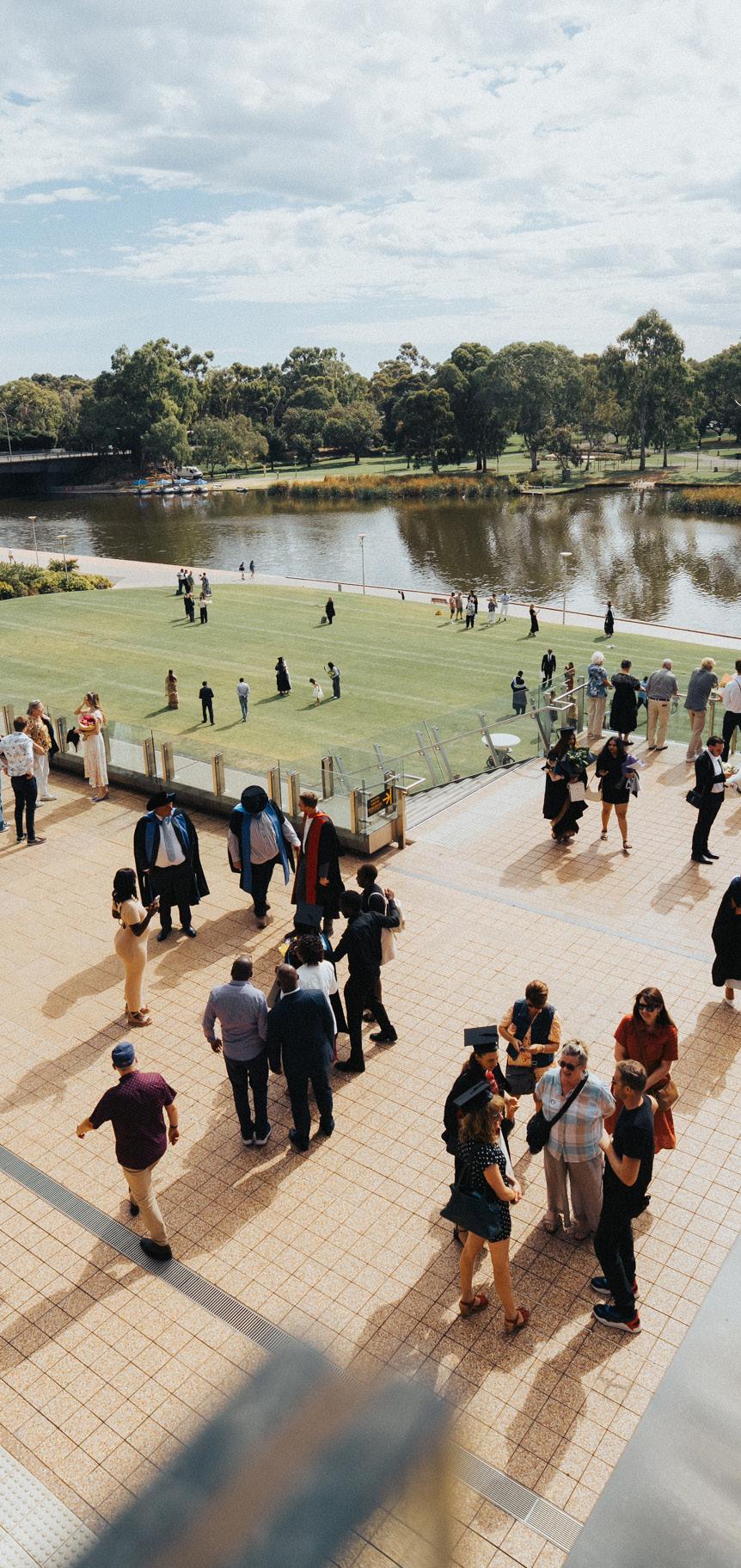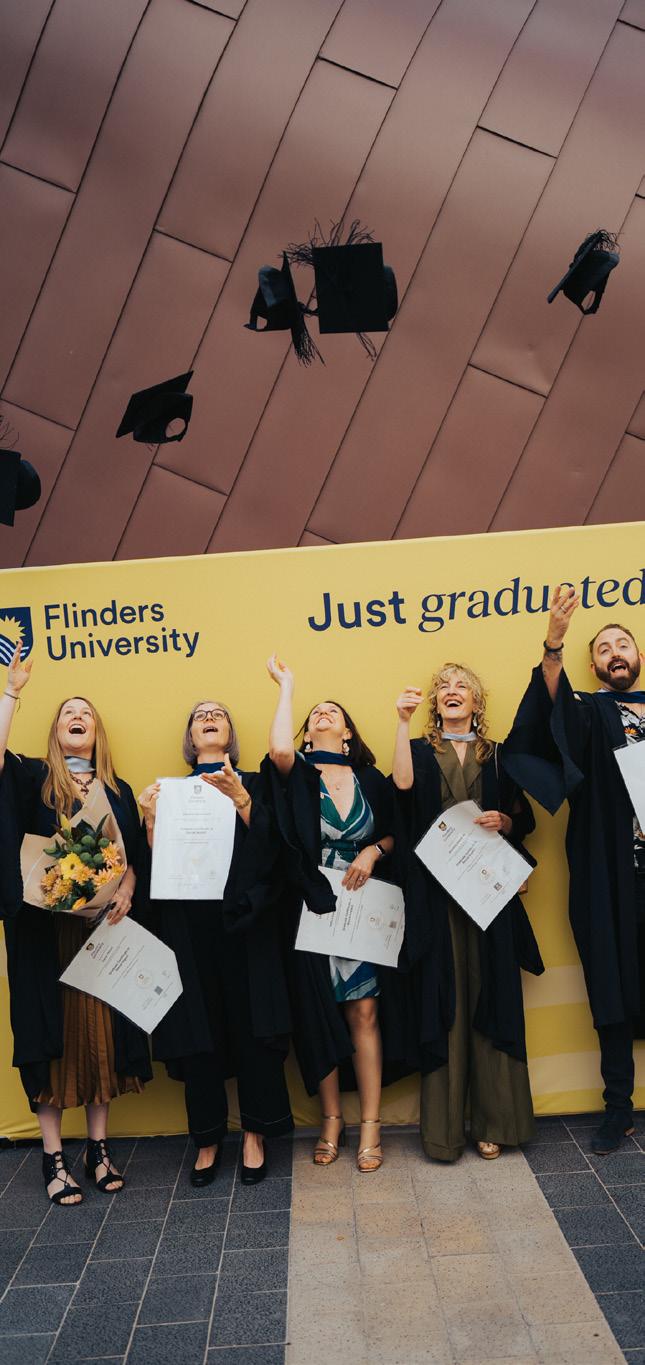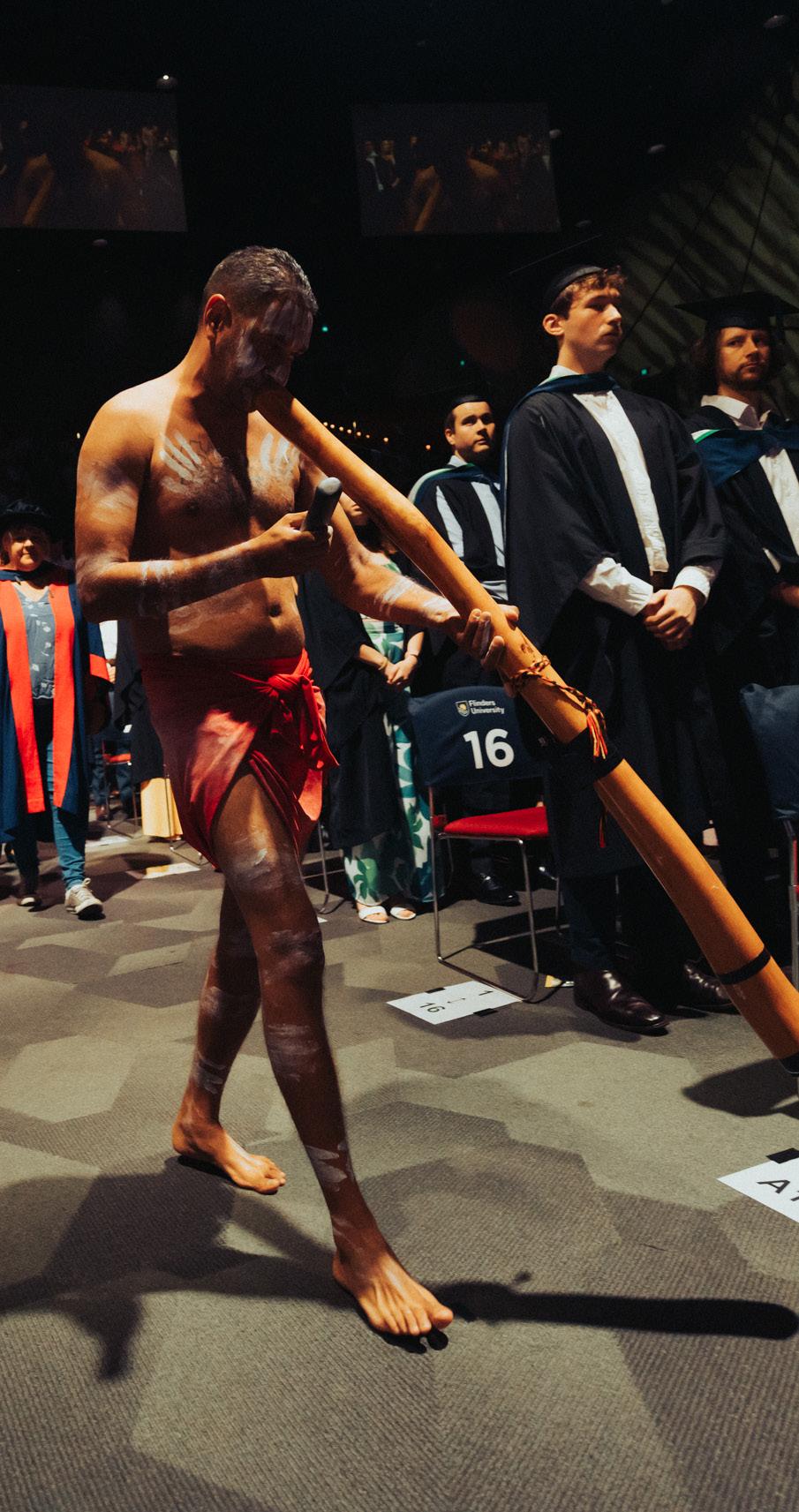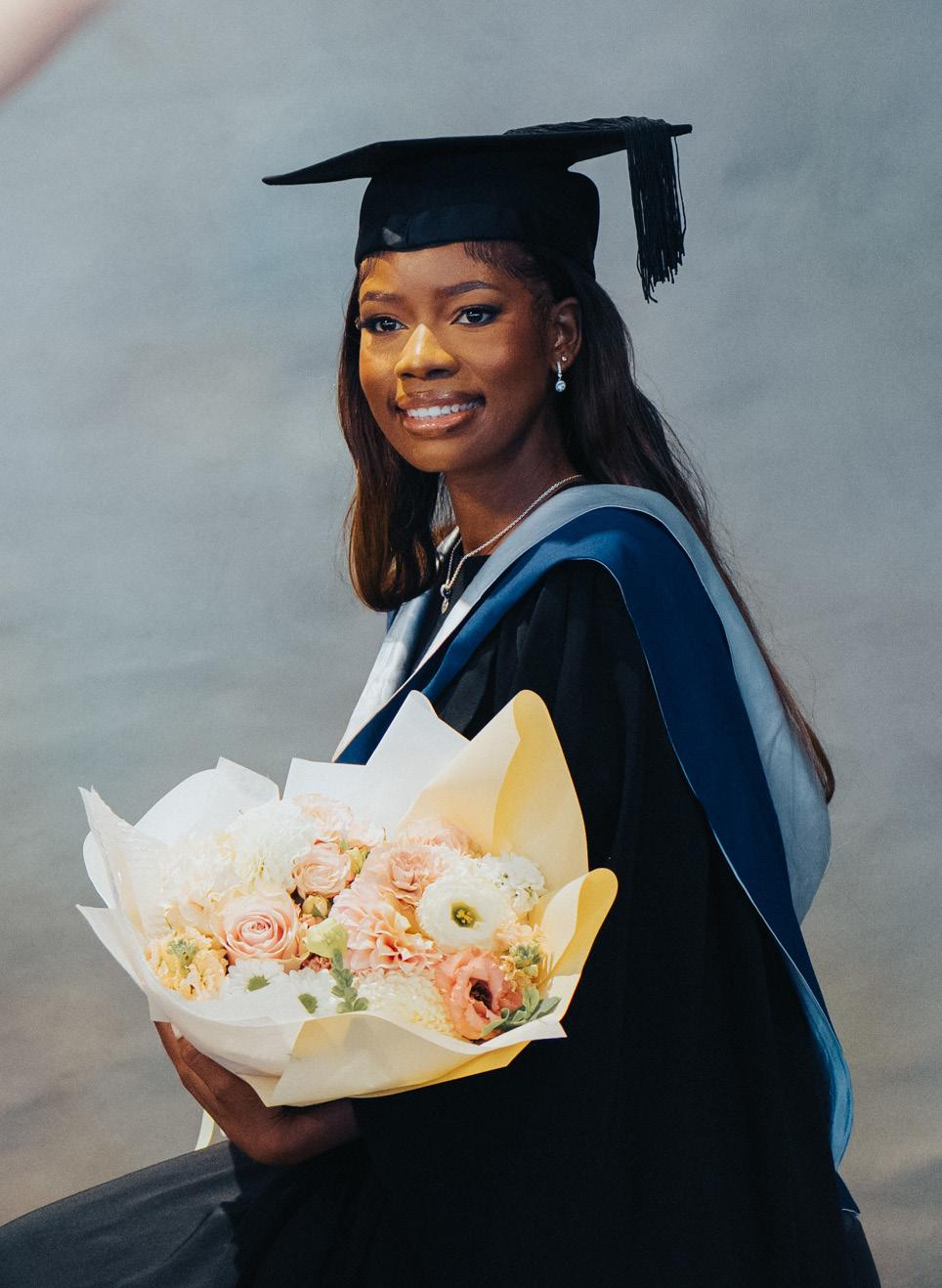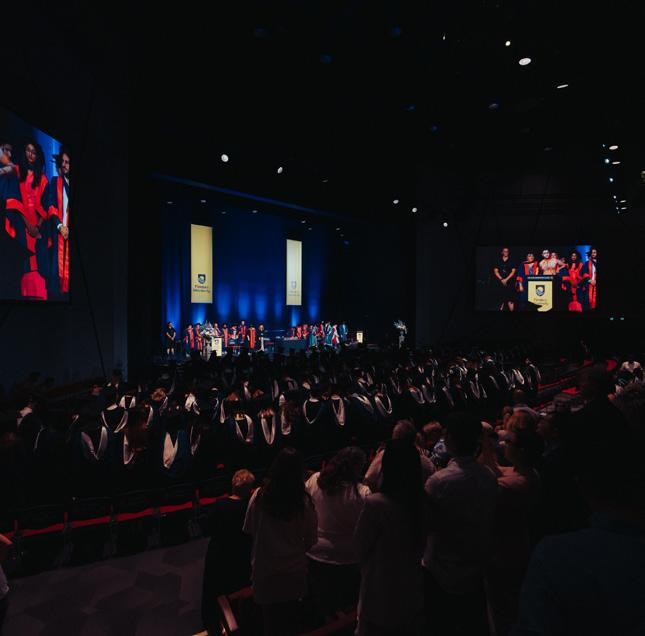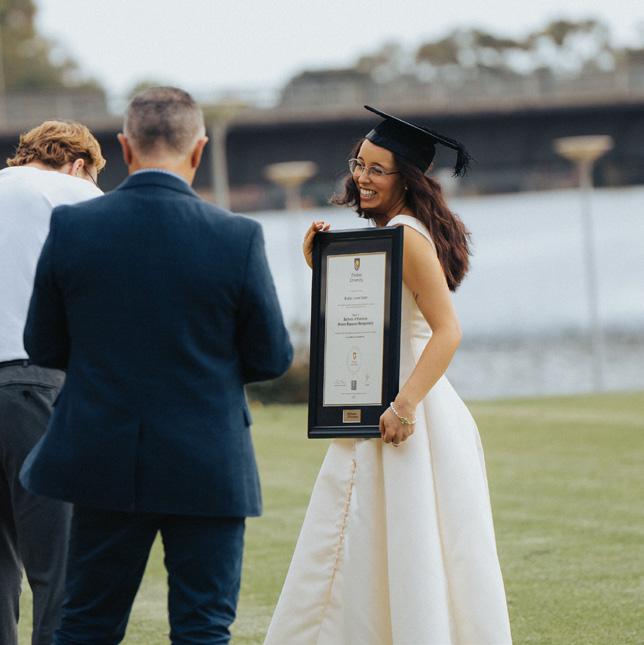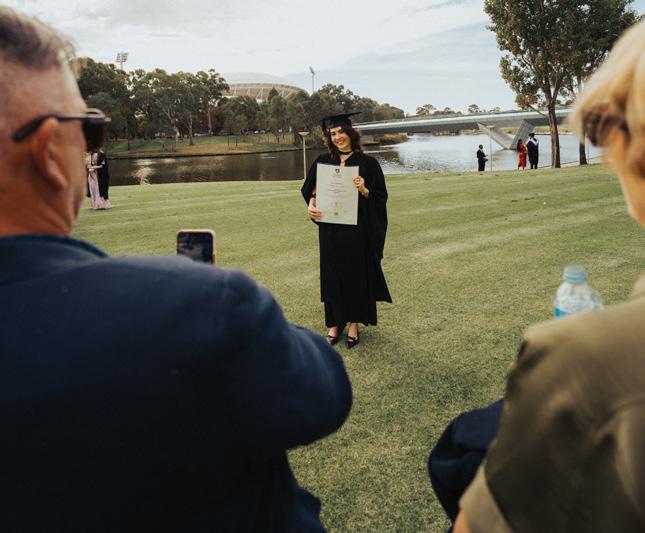THE ANNUAL MAGAZINE FOR FLINDERS UNIVERSITY ALUMNI & FRIENDS / 2025
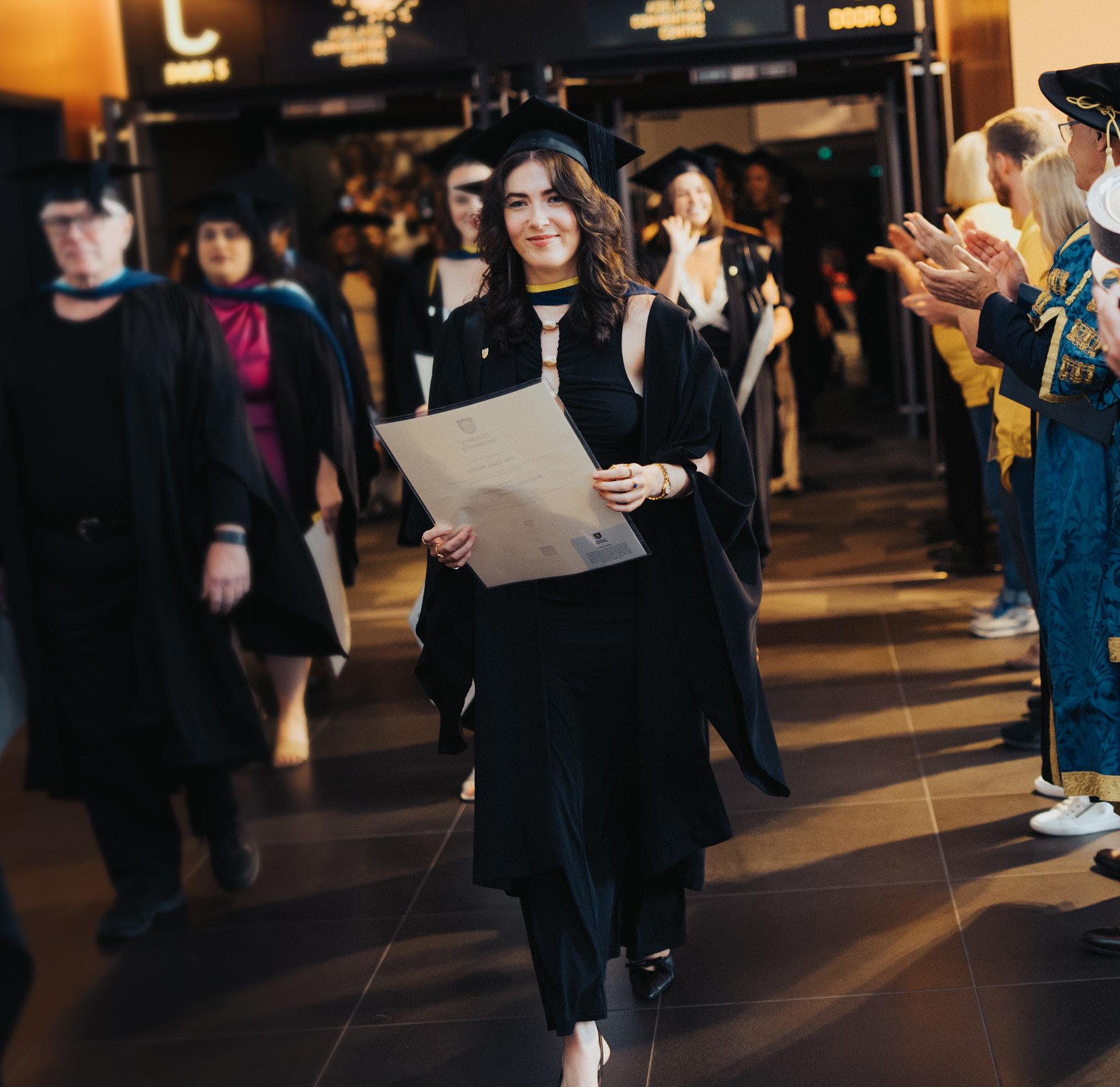
Signed, Sealed, Delivered
Our 2025 graduation ceremonies marked the first significant career milestone in our newly awarded graduates’ lifelong journey of discovery and learning.
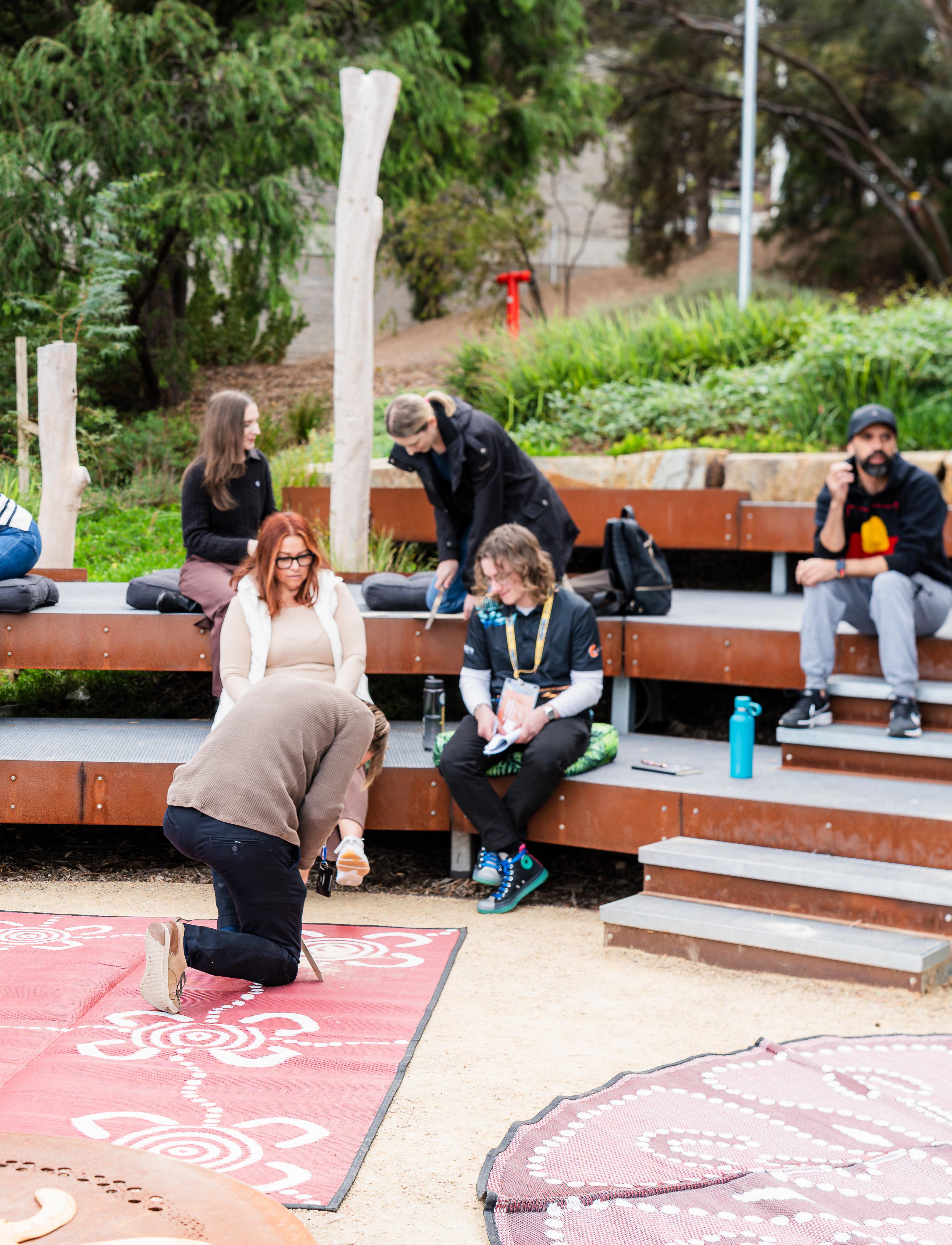

THE ANNUAL MAGAZINE FOR FLINDERS UNIVERSITY ALUMNI & FRIENDS / 2025

Signed, Sealed, Delivered
Our 2025 graduation ceremonies marked the first significant career milestone in our newly awarded graduates’ lifelong journey of discovery and learning.

Flinders University acknowledges the Traditional Owners and Custodians of the lands on which its campuses are located, these are the Traditional Lands of the Arrernte, Dagoman, First Nations of the South East, First Peoples of the River Murray and Mallee region, Jawoyn, Kaurna, Larrakia, Ngadjuri, Ngarrindjeri, Ramindjeri, Warumungu, Wardaman and Yolngu people. We honour their Elders past, present and emerging.
True to our mission: changing lives and changing the world, we’ve continued to focus on delivering impact for our students, partners and the community.
This year, we received strong global recognition from the Times Higher Education (THE) Impact Rankings. Unlike traditional academic league tables, the THE Impact Rankings measure how we contribute to our community and beyond. Overall, Flinders is now ranked 21st in the world for delivering against the United Nations’ Sustainable Development Goals.
Notably, we are also #2 globally for reducing inequality and #5 globally in gender equality. Fairness, inclusion and equity have been foundational principles for Flinders for nearly 60 years. This kind of global recognition confirms that our approach is working, which is something our alumni community can be proud of.
We have also marked one year since the opening of our campus in the heart of Adelaide’s city centre. This space has quickly become a vibrant hub of learning and collaboration, and has opened our doors to students coming from a wider range of suburbs, who now have convenient access to a Flinders education closer to home.
Meanwhile, the Health and Medical Research Building also celebrated its first birthday. This building is becoming a beacon of discovery and innovation, a place where research and clinical care come together with a common goal – to advance health outcomes for all.
In line with that goal, in a game-changer for care and training of the health workforce, Flinders will soon embark on a new $300 million project – the Flinders HealthCARE Centre. Located alongside Flinders Medical Centre, this initiative will provide an additional 10,000 health appointments for people living in the south of Adelaide and see 1,300 new health professionals graduate every year. We are thrilled to have received a commitment from the federal government to provide $150 million in co-funding to bring our vision to life.
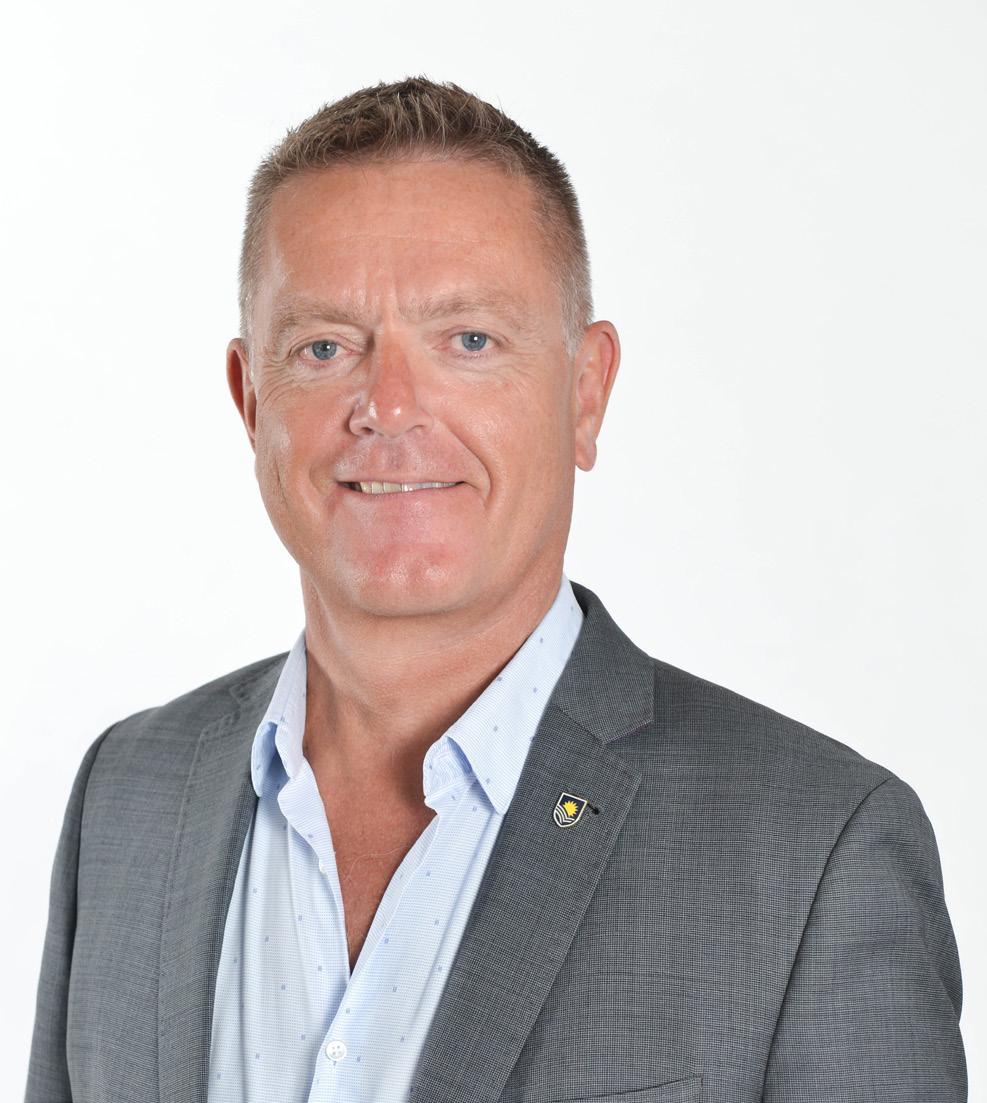
Our focus on health equity also expands to regional areas in South Australia and the Northern Territory. This year we were proud to launch our first fully rural medical degree. Students can now complete the entirety of their medical studies in the regions, taking them to the Barossa, Hills Mallee Fleurieu, Greater Green Triangle, Limestone Coast, and the Riverland. This program not only supports our aim of educational access, but will help deliver much needed medical services to regional people.
And we know impact starts with listening. In our inaugural Wicked Problems report we heard from more than 30,000 Australians about the issues they most care about. These community insights are already helping guide our research efforts, ensuring we are focused on solving the problems that matter.
As you read this edition of Encounter, I hope you feel the same pride and purpose that I do.
Thank you for being a part of our incredible Flinders community. Together, we are building a future that is fearless, inclusive, and full of promise.

Professor Colin Stirling President and Vice-Chancellor

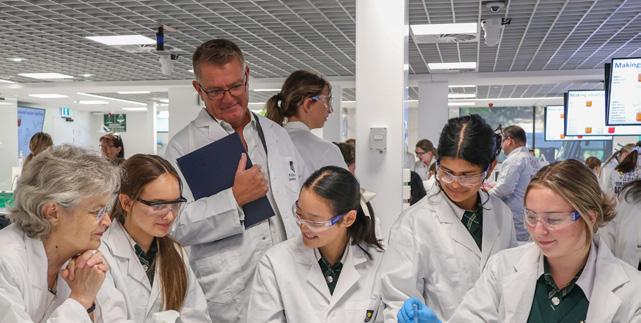

Editorial enquiries
Alumni & Advancement
Flinders University
alumni@flinders.edu.au +61 8 8201 7969
Encounter magazine is published by the Alumni & Advancement Office at Flinders University.
Editor: Leonard Rowe
Design: Woodscannon
Photography: Supplied unless indicated
Production: Kim Pryor
Cover: Bachelor of Creative Arts (Dance) graduate, Ella Molloy walks out of her graduation ceremony at the Adelaide Convention Centre. (Photo by Juan Photography)
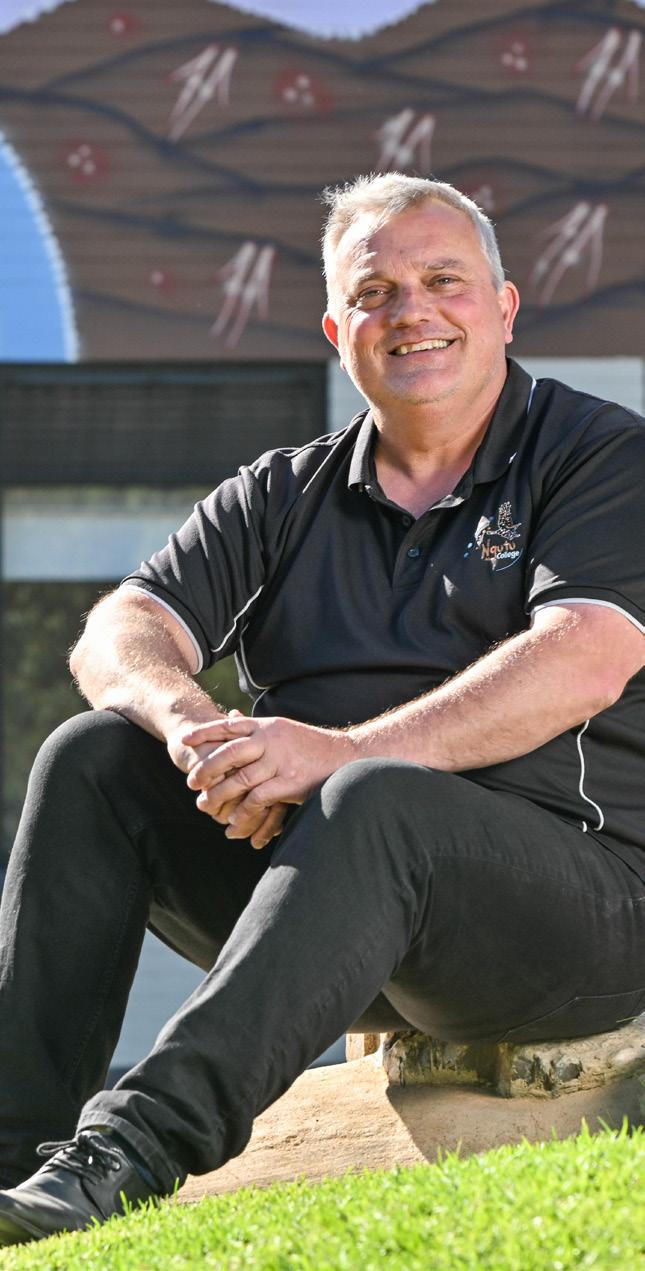


FUMA / Crosscurrents: Exploring coastal narratives and ecologies
/ New York, New York
Disclaimer: Views expressed in Encounter magazine are those of the authors and persons quoted and are not necessarily those of Flinders University.
Copyright © 2025 Flinders University CRICOS 00114A
/ Scholarships grant access to a global stage 32 RESEARCH / Wicked Problems: The issues that matter most to South Australians 33 STUDY / Celebrating 25 Years: The Washington Internship Program
ALUMNI / 2025 Graduation Ceremonies

What a remarkable year it’s been for Flinders University.
It’s a privilege to contribute to the advancement of our institution across local, national, and global spheres. More than ever, Flinders is committed to deepening its connection with the community –and we invite you, our alumni, to be part of this journey.
You know Flinders better than anyone. That’s why we’ve sought your input on the future of our Bedford Park campus through the development of a new masterplan. This plan will help guide future university leaders, shaped by your insights and aspirations.
Importantly, the masterplan goes beyond bricks and mortar. It’s about how Flinders can better connect with the community – through improved transport links to Tonsley and the Adelaide city campus, and by positioning Bedford Park as a central hub in Adelaide’s southern innovation precinct. With world-class facilities and a stunning natural setting, it will attract students, researchers, and academics from around the globe.
We envision a campus that’s vibrant and inclusive – where events, celebrations, and shared experiences bring together students, staff, alumni, and visitors. Our partnerships, grounded in excellence, innovation, and global engagement, will help shape Flinders into a true university town. We look forward to sharing the masterplan with you once its finalised.
50
25
Is your graduating class celebrating an upcoming milestone year? We can help you create a memorable reunion event!
Last year, many of you told us that professional development is a key priority. In response, we’ve launched Law continuing professional development workshops, introduced substantial discounts for Flinders Online and MBA programs, and continued our long-standing mentoring initiatives. You’ll find more details in the pages ahead.
We also celebrate the achievements of our alumni through the Alumni Awards. These honours recognise outstanding contributions to the University, the community, and professional fields – locally and internationally. Don’t miss the inspiring stories on page 19, including Dr Brendan Nelson’s moving acceptance speech (scan the QR code to watch).
Throughout this edition, you’ll read about graduates who have challenged convention and forged their own paths to create meaningful change. Their stories reflect the courage and conviction that define the Flinders spirit.
Please enjoy the 2025 edition of Encounter, and best wishes for the rest of your year.

Ted Wynn Director, Alumni and Advancement


Flinders University is partnering with the South Australian Government to offer new planning and surveying degrees to help address critical skills shortages in the planning professions.
Flinders has committed to develop a modernised planning program aimed at setting national standards and leading innovation in the field of urban and regional planning. The new Bachelor of Urban and Regional Planning, which launched this year, is an important step for the industry as there is currently no undergraduate planning program and a looming workforce crisis. This initiative will complement the surveying double degree, which started at Flinders in 2024.
“The University is currently collaborating with industry experts and professional bodies to develop a curriculum that will meet the future needs of the industry,” says Flinders University Vice-Chancellor, Professor Colin Stirling.
Dr Gerti Szili is a Human Geographer and Senior Lecturer for the new course. With a background in urban and regional planning, environmental studies and anthropology, her core research interests lie in investigating urban and regional regeneration practice and governance, and understanding how communities negotiate landscapes in transition.
“We currently have 16 students enrolled in the inaugural 2025 cohort, and the response so far has been really encouraging,” Dr Szili says.
“Students have engaged positively with the content and are already demonstrating a strong interest in the practical and applied aspects of planning. We’ve had a number of industry touchpoints too, including a 2.5-hour expert panel session where the cohort heard from – and asked questions of – five experienced planners who’ve worked across local and state government, as well as the private sector.”
State infrastructure projects rely on qualified surveyors to set out bridges, tunnels and roads, so this locally delivered degree will aim to produce the graduates needed to assist in addressing the current skill shortages.
Not just for school leavers, the degree is a great fit for anyone passionate about shaping more liveable, sustainable communities.
“It’s especially well-suited to those with an interest in infrastructure (i.e. housing and transport), urban design, environmental management, community engagement or policy,” says Dr Szili.
“We’ve designed the program to be accessible to both new students and mature learners, including those returning to study from related industries or seeking a career change.
“In fact, we already have students enrolled who are working in local government, and there’s been strong interest generated from people working in local councils, construction and architecture firms who are looking to reskill.”
DR GERTI SZILI, HUMAN GEOGRAPHER AND SENIOR LECTURER Scan to find out more
Flinders University has been recognised in the 2025 Times Higher Education (THE) Impact Rankings as one of the world’s leading universities for social impact.
In a powerful endorsement of our commitment to equity, fair access and inclusion through research and education, Flinders has been recognised #2 in the world – and #1 in Australia – for reducing inequalities.
Equally significant is our ranking of #5 in the world – and #1 in Australia – for gender equality, reflecting the University’s leadership in breaking down barriers and building pathways for more women to thrive, academically and professionally.
Overall, Flinders is now ranked 21st in the world, placing us among the top universities globally delivering on the United Nations’ Sustainable Development Goals (SDGs). These rankings are different from the traditional academic league tables. They assess how universities contribute to a better world – through teaching, research, community partnerships, and how we live our values as an institution.
Flinders was founded nearly 60 years ago on the principles of fairness, inclusion and giving everyone a ‘fair go’. These values have been the bedrock of our University and continue to remain central to who we are.
As graduates of our institution, these achievements also belong to you. You’ve helped build a university the world now recognises for making a difference. Thank you.
“We don’t chase rankings – we deliver impact. But when global recognition comes, it confirms that our approach is working.”
VICE-CHANCELLOR PROFESSOR COLIN STIRLING


IN A STANDOUT YEAR, FLINDERS ACHIEVED:



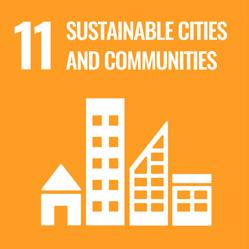


#11 globally for Good Health and Wellbeing
#5 globally for Gender Equality
#2 globally for Reduced Inequalities
Top 50 worldwide for Sustainable Cities
#10 in the world for Climate Action
#10 in the world for Climate Action
Flinders University will embark on a new state-of-the-art health service for southern Adelaide: the Flinders HealthCARE Centre.
Prime Minister Anthony Albanese recently announced a $150 million contribution to support the construction of the new 10-storey facility in the Flinders Health Precinct in Bedford Park, which will provide the local community with 10,000 additional allied health appointments and see 1,300 health professionals graduate each year.
The $150 million capital investment will be matched by Flinders University to fund the construction of the Flinders HealthCARE Centre, featuring three floors of state-of-the-art clinical space, in which 100 patients will be able to be treated simultaneously.
Research and training facilities at the Centre will mean Flinders University can produce work-ready graduates to help fill the current skills shortage, including:
• More than 490 nurses
• 250 social workers
• 128 occupational therapists and speech pathologists
• 101 paramedics
• 60 physiotherapists
• More than 50 midwives
• 24 clinical psychologists
• 180 other allied health professionals.

Design and development is expected to begin later this year, with Flinders targeting construction to start in 2027.
Vice-Chancellor, Professor Colin Stirling, says the $300 million Flinders HealthCARE Centre is a game changer for our community, delivering better care, faster access, and a stronger health workforce.
“This facility will transform healthcare in southern Adelaide while producing 1,300 extra graduates each year to tackle critical workforce shortages.”
“For over 50 years, Flinders has led the way as Australia’s first university embedded in a public hospital. Our $150 million investment, matched by the Federal Government, cements that legacy, delivering world-class care and training for generations to come,” he concluded.
The Premier of South Australia, Peter Malinauskas, who toured the proposed building site, said, “The Albanese Government’s significant new investment in Flinders University’s HealthCARE Centre will help deliver the highly skilled workers needed to staff our growing hospital system.”
“Nurses, midwives, ambos, speech pathologists, physios, psychologists, and other health professionals — this means more of them, trained in world-class facilities.
“It also means up to 10,000 additional appointments each year for patients in the south, to be undertaken at the new Flinders facility.”

South Australians were experiencing wait times of up to 7.5 years for an ophthalmology appointment at Flinders Medical Centre. This delay increased the risk of serious eye conditions, such as diabetic retinopathy and macular oedema, hindering timely treatment and outcomes and escalating the need for additional medical support.
Flinders University partnered with Southern Adelaide Local Health Network (SALHN) Ophthalmology specialists to create an innovative model of care, integrating student-led optometry services. These services complemented and enhanced existing ophthalmology care, reducing wait times and ensuring early access to visual assessments.
• Flinders University provided over 1,000 optometry appointments within 12 months.
• The SALHN ophthalmology diabetic waitlist backlog was completely cleared.
• Ophthalmology waitlist times were reduced by three years.
• Less than 3% of patients seen required referral back to Flinders Medical Centre.
An artist impression of Flinders University's new HealthCARE Centre building

BY DAVID SLY
Building the numbers of female scientists begins with inspiring more young girls to pursue scientific studies, which is why Flinders University has developed the STEM Enrichment Academy.
Created in 2019, the program recognises the underrepresentation of women and girls in STEM – the study of Science, Technology, Engineering and Mathematics. Led by Flinders University Professor of Physics Maria Parappilly, the STEM Enrichment Academy offers intensive hands-on experience with science topics through visits to Flinders University, and has so far inspired more than 1,600 female Year 9 students.
“The core aim is to encourage young women to consider future STEM careers and inspire them to pursue STEM subjects, particularly at a critical moment when they are making subject selections at senior school level,” explains Professor Parappilly.
The Academy has been able to identify the enablers and barriers for girls entering STEM fields and evaluate the positive impact of STEM programs. It also identified particular needs of girls at schools outside of major cities, which is why the STEM Enrichment Academy has expanded since 2023 to include regional students from South Australia and the Northern Territory.
“These regional schools felt as though they had been left behind, but Flinders has the capability to engage girls in STEM from regional and remote areas”
MARIA PARAPPILLY, PROFESSOR OF PHYSICS
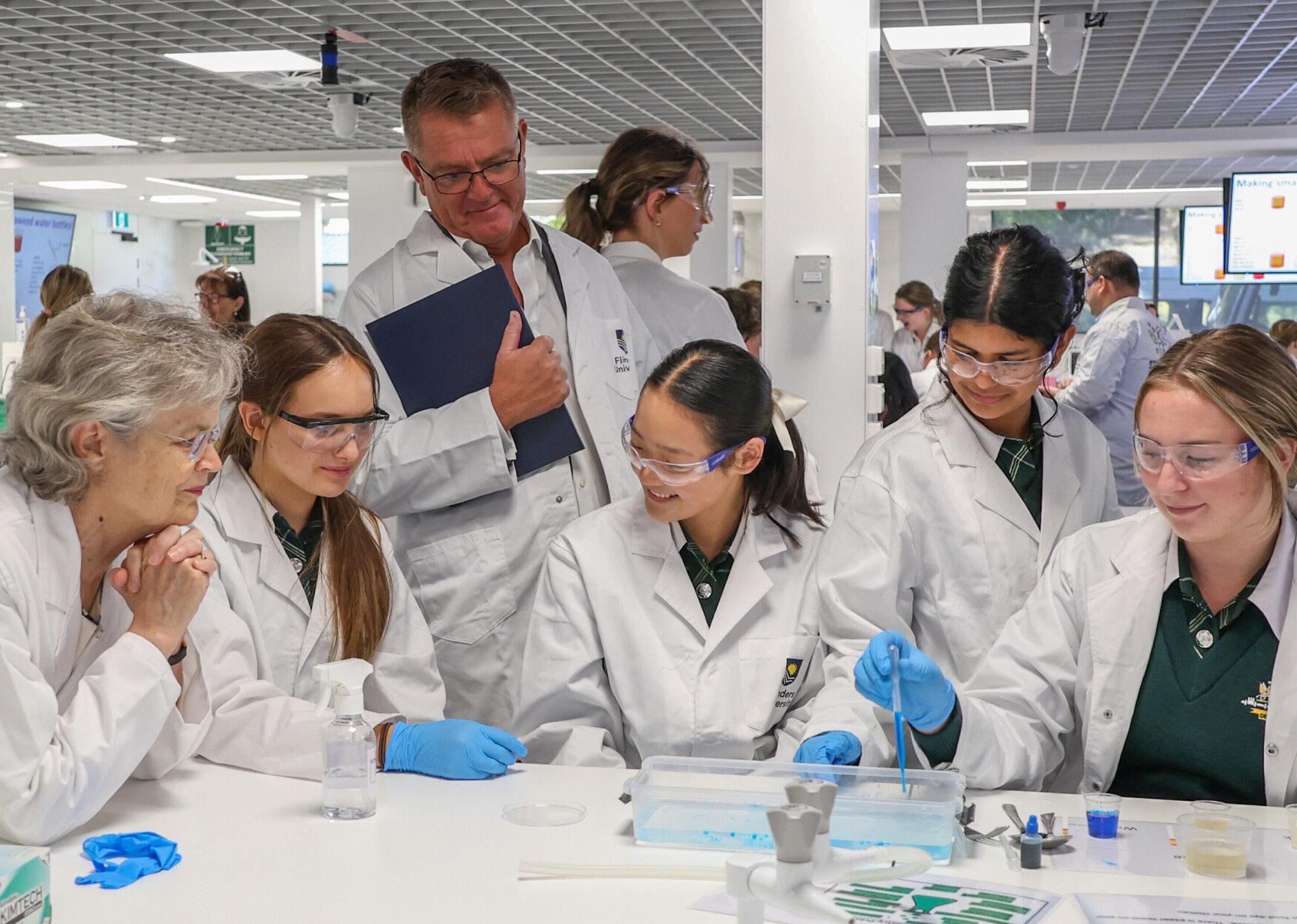
“The big difference is that our Enrichment Academy provides hands-on experience inside the laboratory – not just online theory courses, but something tangible that excites and inspires the students to investigate science.”
This strong impression has been bolstered by the recent $7 million redevelopment of major laboratories and resources in the College of Science and Engineering at Flinders’ Bedford Park campus, which will also benefit school students' learning through a variety of STEM outreach activities delivered in these labs.
“Introducing the girls to this sort of study environment brings to life many of the practical and fundamental parts of science to inspire them," says Professor Parappilly.
As a result, schools that have participated in the STEM Enrichment Academy now have STEM subject enrolment rates well above the national average for girls. Since the program’s inception, 91% of the Year 9 participants have developed an interest in STEM after the program. This includes 330 regional students and 32 Indigenous students who have had access to the program since 2023. Of the 2019 cohort, university enrolments amongst followed-up girls showed a wide range of STEM degrees, including physics. These numbers have exceeded the project target for regional girls by more than four times.
The program’s innovative approach of flying in regional students and teachers for three-day enrichment sessions addressed the lack of resources and other barriers faced by these underrepresented groups.
“Just placing this attention on girls from these remote areas has made a massive difference. Girls who had considered dropping out of school came to the Academy, got inspired and are now leaders in their school science lab. We have seen incredible turnarounds.”
Maths and science teacher Dolina Dyson from Taminmin College in Darwin, a large secondary college that has almost 50% of its students from a disadvantaged background, says participating in the Enrichment Academy had an immediate effect on her students.
“In 2025, there are more Year 10 girls engaged in curriculum and mainstream STEM subjects. They see pathways forward and look for more relevance in their courses, to determine their post-Year 10 pathway,” says Ms Dyson.
The Academy has also supported 263 teachers from 60 schools, through the introduction of a Physics Skills Enhancement Microcredential Course to bolster teachers’ presentation of STEM subjects in class, which is being offered to teachers around Australia.
The course even went over capacity for the August 2025 intake, with teachers enrolling from all across Australia, including regions like Eastern Pilbara, Broome and Margaret River.

“We are upskilling teachers at the same time as we are inspiring young students, and it is vitally important that both these things happen together,” says Professor Parappilly.
“We aim to inspire teachers about how best to inspire their students – and this has included Dr Ken Silburn from New South Wales, who received the Prime Minister’s Prize for Science - Secondary teaching.”
Many of the initial girls who participated in the STEM Enrichment Academy are now at university and pursuing degrees. This includes Victoria Rowe, who is currently studying Nuclear Engineering at Flinders University and visited Rhode Island University in the United States during 2025, as part of a 15-week study exchange program.
“It’s very exciting that we will soon have alumni that have been a part of the Enrichment Academy,” says Professor Parappilly.
“Those girls will be the role models to the younger students coming to the Academy, as the living proof of what can also lay ahead for girls who pursue STEM studies.”
BY LEONARD ROWE
The notion of building a school from the ground up has probably crossed many educators' minds, however the realities of endless red tape and immense monetary hurdles are usually enough to keep those grand plans from ever coming to fruition.
Not so for Andrew Plastow (BEd(UP/LS) '91), whose spark of an idea to create an independent, not-for-profit, socially-just college was strong enough to gain momentum and backing from the community.
Ngutu College on Kaurna Country in Woodville North, South Australia works from a Reggio Emilia principle that the environment is the third educator. Currently a Reception to Year 11 school with plans to offer Year 12 in 2026, young people are valued and supported to fulfil their creative potential and given every opportunity to explore their individual interests. What’s more, rather than being affiliated with a religion, Ngutu College integrates and privileges Aboriginal knowledges within the formal curriculum.
“Schools generally operate from the notion of preparing young people to get jobs, whereas we focus on the child and valuing childhood, being in the moment of today,” says Andrew.
“I’ve previously heard teachers say things like, ‘so and so owes me a page of writing’, whereas our kids aren’t writing for us, they’re writing for themselves. Immediately, that changes your experience of what schooling is for.
“We don’t call them school students because they don’t belong to us, we’re a place that’s here for them to come for a range of life experiences.”
Andrew had made his mind up that teaching was the path for him at an early age.
“I moved a lot as a child – my 10th birthday was in my 10th house! I think part of that led to schooling experiences that weren’t ideal,” explains Andrew.
He got the marks needed to begin his teaching qualification and credits Flinders for helping him reach that first goal of graduating.
“I had the misfortune of my younger brother dying when I was studying. Through that experience, I found that the support offered to me from lecturers was amazing. It may not have been possible to finish at the time without it,” Andrew says.
“I actually didn’t know I was Aboriginal until after graduating, but I still started my teaching career with a really clear understanding of Aboriginal issues and culture, thanks to Flinders, and subconciously it felt right to follow this path of helping Aboriginal kids.”
After graduating, Andrew taught in the country, finding it very similar to his own schooling – dull. After a term, he took an opportunity in Whyalla to work part time in a withdrawal unit for children who had been kicked out of school. Although it was less pay and further away, he thrived and it set him off on an alternative career path.
“I could see these kids, although not allowed to be in school, were actually great little human beings that mainstream school clearly wasn’t catering for.” Andrew says.
As Principal of Alberton Primary, Andrew had found success. He transformed a previously struggling cohort into a centre of excellence, receiving praise. However, he felt there was still more that could be done to help troubled youth achieve their best.
“We were finding we would have these amazingly talented Year 7 Aboriginal kids graduating, then hear that halfway through Year 9 they had dropped out of school,” Andrew says.
“I wanted to expand Alberton to a high school, but the idea was knocked on the head pretty quickly. Then, a uniform approach to primary school teaching was introduced that made my role difficult, as I feel we needed to represent the community not fit a mould, so I made the decision to resign in 2019.”
After presenting at a school retreat, the idea of starting a school was bandied around fellow educators. Andrew questioned if this was even possible. Turns out, there are three things you need for a school.
“One is money, another is a a site, and the other is registration,” explains Andrew.
“To get a site you need money. To get money, you really need to be registered for people to be willing to help. To get registration, you must demonstrate that you’re financially viable. It was a bit of a catch 22!”
On 1 February 2021, Ngutu College had 90 children and their families on site, just based on expressions of interest, ready to start their educational journey. Andrew had reached an agreement with the school site’s landlord and social impact investors who were willing to lend the money.
“We weren’t allowed to let them into the classrooms until we had registration, so we took them down to the park,” says Andrew.
“We came back, had our formal opening, and in the middle of the opening I got the phone call from the registrar to say we were approved. The rest is history!”

“Any medium to express yourself, that’s what we call a language,” says Andrew.
“I don’t just mean Kaurna language or English, which is still part of what we do, but the language of dance, or the language of saxophone, or the language of binary digits, and so on.”
Children at Ngutu College are given the opportunity to base their schooling on the foundation of their preferred language..
“Having a range of experiences means it is more likely that a young person is going to find their language,”
ANDREW PLASTOW
“One of our current Year 10s came to us in Year 7 having never played music before. She got the opportunity to access her preferred language here and she proficiently plays about six instruments now!”
By 2027, the hope is that every one of Ngutu’s graduates will have a staff member allocated for ongoing support once they graduate.
“We talk about hope a lot. I want children to leave here optimistic and resilient, and for them to feel that they have found their pathway which they can confidently continue on,” he says.
This year, Flinders University is celebrating 50 years of delivering nursing education to generations of nurses who care for patients, advance research, transform healthcare, and educate the next cohort of nurses and health professionals in South Australia, across Australia, and around the world.
1975 saw the development of the ground-breaking nursing curriculum at Sturt College of Advanced Education, the precursor institution of Flinders University. This was the first tertiary institution in South Australia, and only the third in Australia, to offer a program designed to prepare students of nursing to obtain their qualifications.
The late Joan Durdin AM, RN, FRCNA (Hon), (DUniv ’94) was instrumental in the establishment of the nursing course. A distinguished nursing education pioneer, Joan worked tirelessly throughout her life to improve the professional status of nursing across Australia and internationally. The annual Flinders University Joan Durdin AM Oration, named in her honour, will be combined this year with a celebratory cocktail function to acknowledge the 50-year anniversary of nursing education. We invite you to join us to celebrate this significant milestone. All nursing alumni, current and previous staff and our industry partners will be invited to reconnect, reminisce and rejoice.
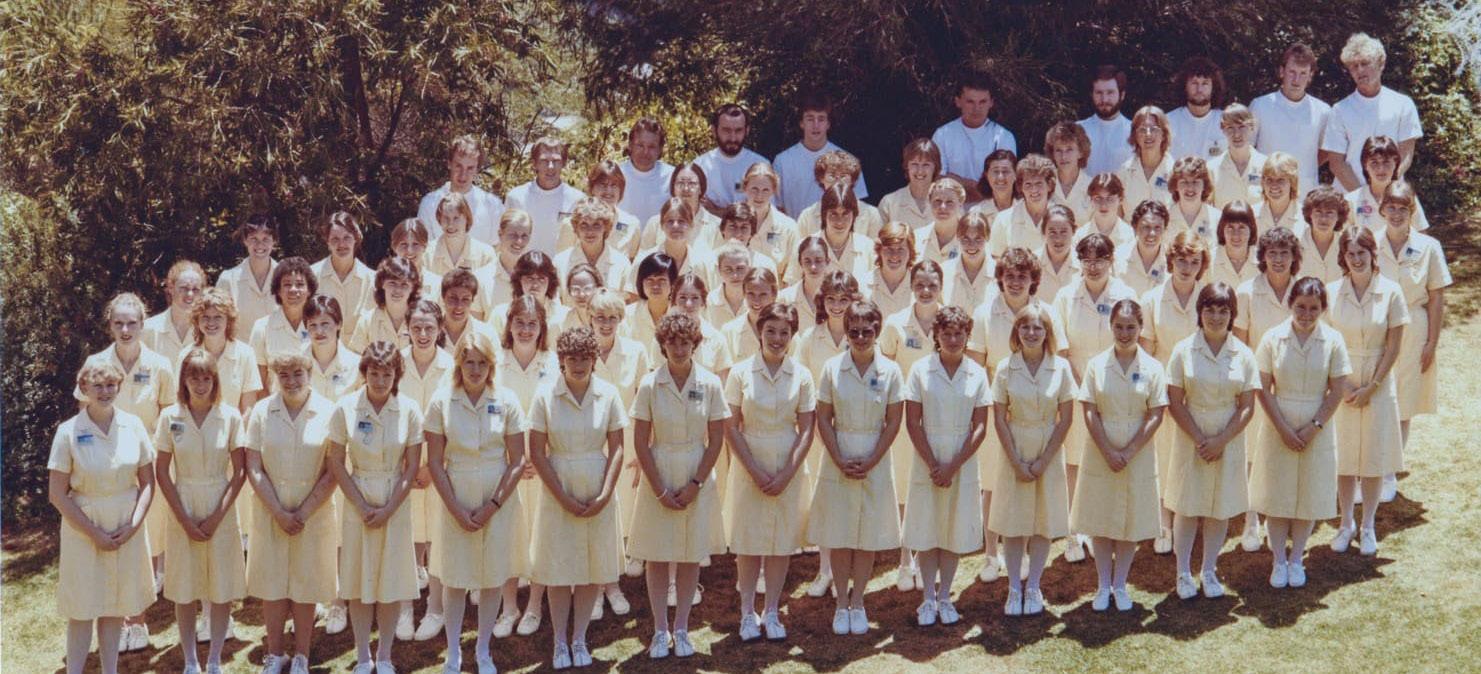
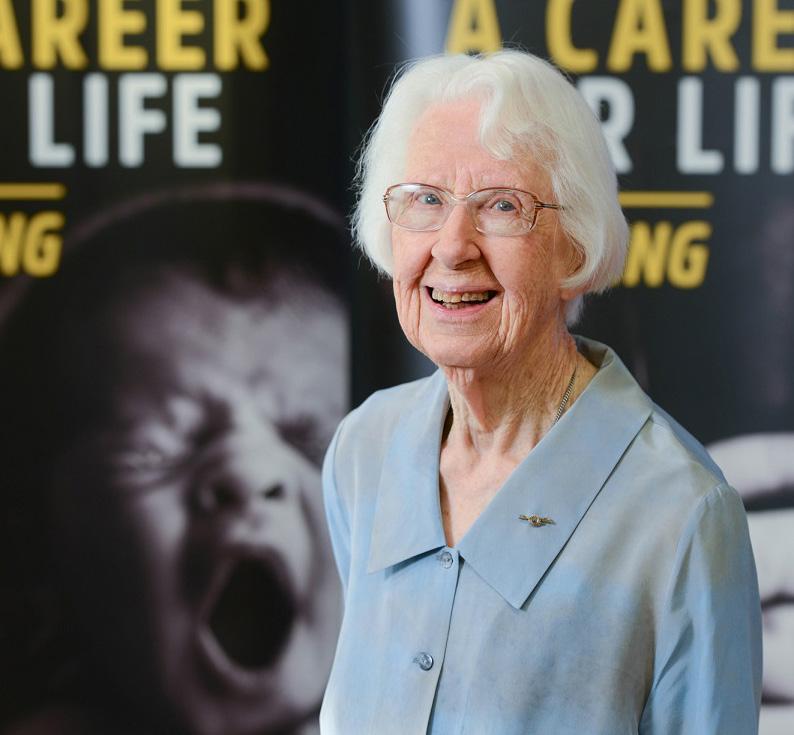
Join us at the 50 Years of Nursing Celebration Cocktail Evening in October to acknowledge the achievements of our alumni and academics, past and present, and celebrate the University’s impressive nursing program. Australia’s Chief Nurse and Midwifery Officer, Adjunct Professor (Practice) Alison McMillan PSM will deliver the annual Joan Durdin AM Oration as part of the evening.
Scan the QR code to learn more about our 50-year celebrations.
When and where:
Date: Friday 24 October 2025
Time: 6-9pm
Location: The Conservatory, Ayers House

Want to find out more? Scan here
Drawing on the 50 years’ experience housed in the College of Nursing and Health Sciences, the Nursing Leadership Mentoring Program has been successfully connecting students and early graduates with established healthcare leaders (preferably Flinders alumni) since 2023.
The purpose of the program is to facilitate mutually beneficial mentoring relationships that provide high achievers an opportunity to connect with an established healthcare leader to develop their skills for the future. Mentors are provided an opportunity to enhance the mentee's confidence and knowledge, while developing their own leadership skills. While in turn, the mentees benefit from the support and advice of an experienced nurse leader to aid them in becoming highly effective healthcare leaders.
Mentoring in nursing can be hugely rewarding for both mentors and mentees. The collaborative confidential relationship gives mentors the opportunity to give back to their profession and support leadership development. On the flipside, mentees gain knowledge, become empowered, build confidence, and develop skills to become leaders in their profession.
Mentors benefit from:
• Exposure to fresh perspectives, ideas and approaches
• The opportunity to reflect on one’s own goals and practices
• The chance to practice their interpersonal skills
• Personal satisfaction through supporting the development of others
Mentees benefit from:
• Access to a senior role model, with a peer relationship that is separate from your workplace to guide and support your career development.
• Being encouraged and empowered in personal development.
• Developing purposeful self-reflection skills to identify leadership aspirations.
• Advancing communication and networking skills.
“My mentor really helped me to examine the many ways in which leadership skills can be applied to both my everyday practice and in the achievement of my personal leadership goals. Suffice to say; participation in the program has far exceeded my expectations and has given me the momentum to develop a plan of how to best achieve my leadership goals going into the future.”
NURSING LEADERSHIP
MENTEE PARTICIPANT
BY DAVID SLY
Great medical ideas can come from the most unlikely places – such as a grandmother on a farm using a skateboard to rehabilitate after major knee surgery.
Dr Matthew Liptak (BM, BS ’96), who graduated from Flinders University in 1996 and became a Fellow of the Royal Australasian College of Surgeons (Orthopaedic Surgery) in 2007, seized on this peculiar idea to design a brilliant new medical device, MAXM Skate, which is helping to speed patient rehabilitation after knee and hip replacement surgery.
This roller-skate-like device straps to the foot for easy and smooth movement, while inbuilt sensors measure the angles of the user’s knee while they are using the device. This data is sent to both the user’s smartphone and their clinician for monitoring.
This combination of both a tangible tool and a digital device has proved a winning formula, leading to the commercialisation of MAXM Skate and it now being sold in 23 countries.
“I was working at Portland Hospital in Western Victoria during 2012, and I noticed a grandmother whose rehabilitation from knee surgery was progressing much quicker than expected,” recalls Dr Liptak.
She wasn’t my patient, but I asked her what she was doing – and she explained that she was stuck out on her family farm without access to hospital rehabilitation services, so she strapped her grandson’s old skateboard under her foot and rolled it back and forth while she was sitting at the kitchen table.
“It was such a brilliant piece of ingenuity to improvise and achieve a terrific result, and it got me thinking that a more sophisticated version of this could provide an important breakthrough in rehabilitation after knee and hip surgery.
“To recover from a knee replacement, patients must perform rehabilitation exercises, but some don’t recover as quickly as others because they don’t stick to their motion and strengthening exercises. The MAXM skate makes it easier for them, reduces their pain during rehabilitation exercises and speeds their recovery.”
Dr Liptak created the company MAXM Skate to develop this innovative device, with help from Flinders University’s Medical Device Partnering Program (MDPP), which developed the digital sensors inside the device, which measure the angles of the user’s knee movement and stores this as digital data. Enabling patients to track their progress has been a great motivational tool to encourage perseverance with rehabilitation.
“The results have proven that outcomes are exceptional – and more far-reaching than we expected. For instance, people who used MAXM Skate regained normal movement more quickly, suffered two time less depression than other people going through rehabilitation, and had significantly reduced pain,” says Dr Liptak.
Dr Liptak has long been a high achiever, having also enjoyed a career as an elite AFL footballer, playing nine seasons with the Adelaide Crows – while he simultaneously juggled many years of medical studies, and work as an orthopaedic surgeon after graduating.
“Going to university at a very young age, starting my studies at 16, I had initially thought that a doctor simply focused on broken bone/fix bone, so it soon became clear that I had a lot to learn, while I was simultaneously putting so much into sport. I did defer studies because I wasn’t aware of where I was going at that stage,” says Dr Liptak. “Perspective came with time, and I really enjoyed combining both medicine and football, because I love effective time management skills, which have continued to shape my career.”
His fight to overcome significant soft tissue injuries in the later part of his football career – he remembers playing only 13 games in his final three years with the Adelaide Crows – led Dr Liptak to share greater empathy with his patients trying to recover from surgery. “It’s important to be able to acknowledge the pathways that patients go through. Rehabilitation is all about promoting movement, then strength, then function – and I know that from personal experience.”
Since graduating from Flinders, Dr Liptak has become a prominent Adelaide orthopaedic surgeon, building a career based on best outcomes for patients. He specialises in knee arthroplasty and sports injuries, with research also being a prominent part of his portfolio. He is a member of The Australian Knee Society and has been innovative in providing medical audiences’ access to live surgery viewed digitally –locally, nationally and internationally.
The capabilities of MAXM Skate are now being pushed further, with Flinders PhD student Alicia Mitchell investigating how AI can further enhance motion sensor accuracy and predict rehabilitation progress.
“This idea continues to move forward,” says Dr Liptak.
“Patients get it and doctors get it, health stakeholders get it, but disrupting set rehabilitation behaviours is a big challenge to work through. Beyond this, we are very confident for the future because we know this product, which improves patient outcomes so significantly, is a winning formula.”
“Patients
get it and doctors get it, health stakeholders get it, but disrupting set rehabilitation behaviours is a big challenge to work through. Beyond this, we are very confident for the future because we know this product, that improves patient outcomes so significantly, is a winning formula.”
DR MATTHEW LIPTAK, FOUNDER, MAXM

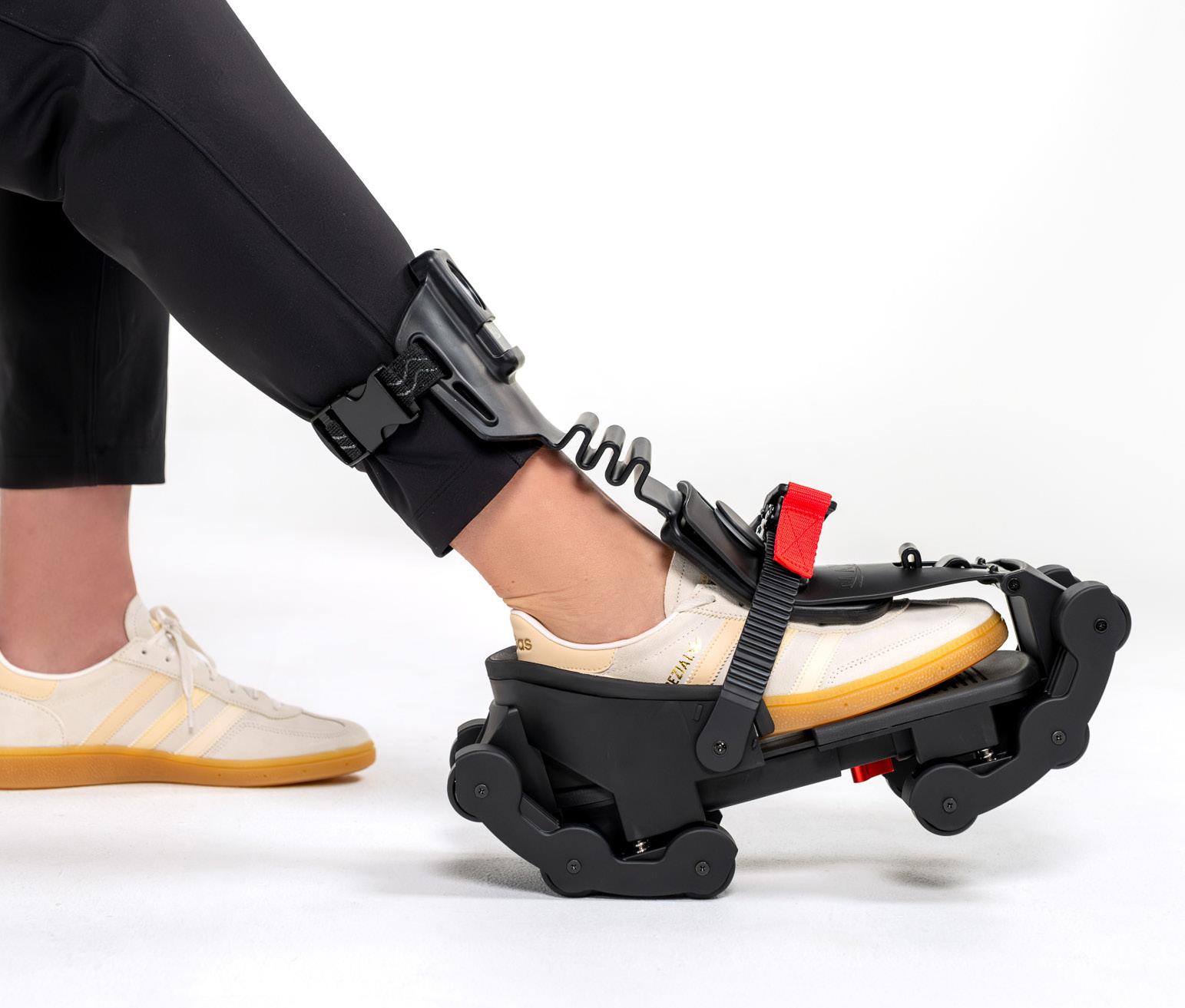


As South Australia’s beaches continue to be impacted by tiny but powerful algal forces, Flinders University Museum of Art (FUMA) this year showcased Crosscurrents, an evocative exhibition tracing the coastal edges of Ngarrindjeri, Kaurna, and Narungga waters of South Australia.
Bringing together commissioned works by six South Australian artists – Brad Darkson, Chris De Rosa, Honor Freeman, Michael Kutschbach, Sonya Rankine, and Mary-Jean Richardson –Crosscurrents presented a richly layered exploration of place, where speculative sculpture, reimagined cultural practice, and collaborations with marine ecologies converge.
While our coastlines grapple with loss of sea life and toxic foam, seemingly caused by algae drawn to warming waters, the exhibition reflected on the stark realities of bioprospecting - extracting biological resources from nature for commercial purposes.
At the same time, the artists celebrate the intimate rituals of coastal life including swimming, walking, and observing the ever-shifting thresholds of land, sea, and sky.
“The intersecting narratives of Crosscurrents reveals the myths, histories, images, and objects unique to this stretch of South Australian shoreline, while evoking universal experiences of the coast,” says exhibition curator Dr Belinda Howden.
Engaging deeply with the textures, histories and ecologies of South Australia’s coastal landscapes, these artists foster dialogue between artistic practice, cultural heritage and environmental stewardship.
They invite audiences to look beyond the surface of their works, to consider the unseen currents shaping our understanding of these regions and to acknowledge their deep histories and precarious futures.
“Crosscurrents is a compelling and timely exploration of our connection to the coast, in the face of rapid ecological and cultural change,” says FUMA Director Fiona Salmon.
“Highlighting the role of artists as storytellers and agents of change, we hope this exhibition prompted audiences to consider their own relationships with the natural world.”
Crosscurrents is one of the many free exhibitions open to the public at FUMA.
For further information, visit flinders.edu.au/museum-of-art.
Flinders University Museum of Art Ground Floor, Social Sciences, North Building, Flinders University, Bedford Park Gallery.
Open Monday-Friday 10am-5pm and Thursdays until 7pm. Free Entry.
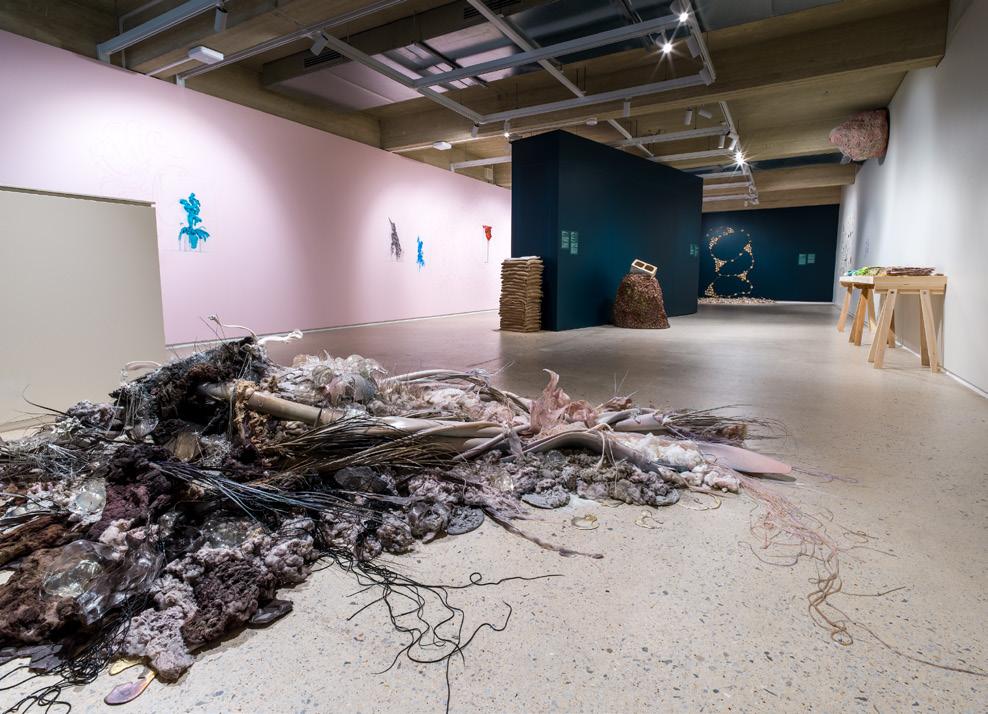
Installation view: Crosscurrents, 2025, featuring cnidølysis noeëidolon by Michael Kutschbach, 2025, Barroco Slump by Mary-Jean Richardson, 2024—2025, Swollen by Honor Freeman, 2025, and Wrack by Chris De Rosa, 2025; Flinders University Museum of Art, Adelaide © the artists, photo: Grant Hancock.
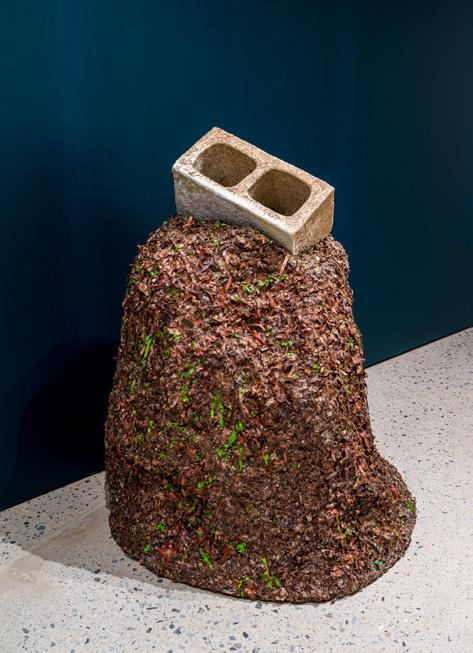
Honor Freeman (born 1978), Full fathom five, 2025, stoneware and porcelain, marine matter, 17 x 17 x 36 cm and Chris De Rosa (born 1958), Wrack, 2025, papier-mâché, paper, collected organic and inorganic debris, marine matter, 90 x 70 x 70 cm. On loan from the artists, Flinders University Museum of Art, Adelaide © the artists, photo: Grant Hancock.
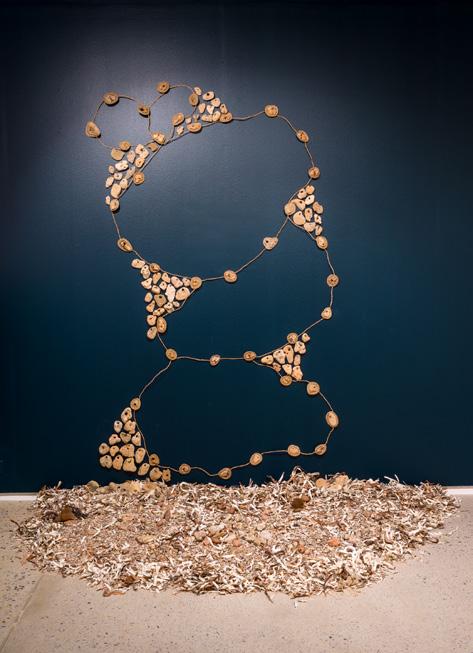
Sonya Rankine (born 1970), GUUYANGGA-BARNDA – FISH TRAP, 2025, barnda (rocks), bundu (Ghania filum), waxed polyester thread, sand, 240 x 240 x 116 cm. On loan from the artists, Flinders University Museum of Art, Adelaide © the artists, photo: Grant Hancock.
The Flinders University Alumni Awards acknowledge the significant contribution made by Flinders graduates to the University, the community or within their chosen field, locally and overseas.

Dr Brendan Nelson AO
BM,
BS ’83, DUniversity ‘11
Awarded for outstanding leadership and impact in the public and private sectors.
Throughout his remarkable career, Dr Nelson has made decisions that have shaped Australia’s future. He has chosen the vessels that safeguard Australian waters, shaped policies that changed the nation’s trajectory, and represented Australia on the international stage as the country’s ambassador to NATO.
The first in his family to attend university, Dr Nelson grew up in modest circumstances. His parents, who had struggled to make ends meet, pinned their hopes for a brighter future on their son’s education.
“I didn’t really know what I wanted to do,” Dr Nelson recalls. “But I did a lot of thinking about it and came to the conclusion that people who end their lives with the greatest sense of satisfaction are people who spend their lives in the service of others. So I applied for medicine at Flinders University, and it changed my life.”
After graduating, Dr Nelson moved to Hobart in 1984 to work at the Royal Hobart Hospital. Rising through the ranks of the Australian Medical Association, in 1995 he received its highest honour, the Gold Medal for Distinguished Service to Medicine and Humanity.
From 1996 to 2009, Dr Nelson served as a member of the Australian Parliament, including five years as Minister for Education, Science and Training, followed by two years as Minister for Defence.
Following his parliamentary career, Dr Nelson became Director of the Australian War Memorial, where he oversaw transformative reforms and secured a $550 million redevelopment. In 2019, he transitioned to the private sector, joining Boeing Australia.
Now based in London, he was appointed President of Boeing Global in late 2022. Today, Dr Nelson oversees Boeing’s global operations outside the United States, leading 30,000 employees across 50 countries and generating $25 billion in annual revenue.
Scan to watch Dr Nelson’s acceptance speech.

Catherine Fitzgerald
BA '81, BA(Hons) '82
Awarded for distinguished contribution to South Australian theatre and performance, including the promotion of diverse communities.

Simon Schrapel AM
MPolAdmin ’05
Awarded for distinguished contribution to social justice locally and nationally through welfare organisations, programs, and initiatives.

Professor Tom Gordon PhD(Med) ’87, DM ’96
Awarded for distinguished leadership, innovation, and research in the field of human autoimmunity.
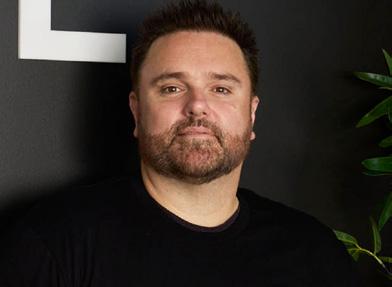
Greg Taylor BCom ’05
Awarded for distinguished leadership and commitment to creating a sustainable, ethical business and supporting entrepreneurs.

Sara Carrison
BMedSc(VisSc), MOpt ’19
Awarded for significant contribution to First Nations’ eye health and advocating for a culturally safe and inclusive environment within the profession.

Thao Hoang MSW ’21
Awarded for significant service in the field of child protection, focusing on families from culturally and linguistically diverse backgrounds.

Lauren Hillman
BA ’00, BA(Hons) ’02
Awarded for distinguished leadership in the South Australian screen sector and for supporting emerging on-screen artists.

Professor Anthony Williams PhD(PhysSc) ’85
Awarded for distinguished research leadership in subatomic physics.

Dr Xuan Luo
DipCommInfTech’08, BHumNut ’12, MBiotechSt ’14, PhD(Med) ’19
Awarded for significant contributions to the fields of biotechnology and nanotechnology and as an advocate for sustainable manufacturing in the healthcare sector.
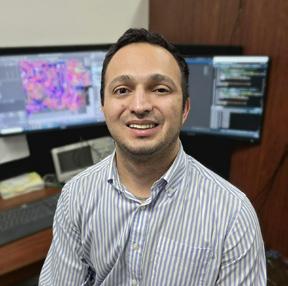
Dr Emad Roshandel PhD ’23
Awarded for significant research expertise in electrical and electronic engineering to support the development and commercialisation of new technologies and innovations.
BY DAVID SLY
The positive energy of Zjantelle Cammisa Markel (LLB, BA ’98) has propelled her legal career onto the international stage. Using the knowledge garnered from studying law at Flinders University, she has made the great leap to run her own successful law firm in New York City that specialises in US immigration law, representing organisations and individuals from all over the world.
“Nothing was planned this way,” says Zjantelle. “I started travelling around the world and never came back. What I found is that the beauty of obtaining a law degree in Australia, which is a common law country – not a civil law country, such as Italy, Germany or France – means my Flinders Bachelor of Laws qualification is acknowledged in the US, where you only need to take the bar exam to become qualified as an attorney.”
Her journey reflects her ability to react in the moment to opportunities, as she admits that on graduating from Flinders, she had no intention of using her law degree as an international passport for employment.
“My intention was to travel around the world for six months, as I have an Italian passport, and come back to work as a lawyer in Sydney,” says Zjantelle.
It didn’t unfold that way; after several months’ work in Rome, mostly translating legal documents from English to Italian, she went to London and did litigation for a law firm.
“I had a round-the-world airline ticket that had to be used within a year, so I decided to honour that in 1999 by going from London to New York, then California back to London – but again things changed. I fell in love with New York City.”
She also made contact with a New York-based lawyer she had met while on vacation in Greece several years earlier. He encouraged Zjantelle to stay and give New York City a go.
“He said that if I didn’t give it a go, I would always wonder what would have happened if… I said I’d give it two weeks and if I found a job in that time, I’d give it a go. So he introduced me to an immigration lawyer who offered me employment, and that’s how I got my first visa.”
“I found that my love of languages became a real asset in immigration law. I had done an Arts/Law degree at Flinders and majored in Italian, but I had also studied Greek, French and Spanish. This area of law was engaging with people who spoke so many languages. I was in the right place with the right skills.”
She also engaged actively in local groups, joining the Young Executive Committee for the Italian Chamber of Commerce in New York during 2002. At a networking party, she met a hotelier who needed urgent work visas for hotel management staff he was bringing in from the Czech Republic, Canada and Spain.
“He asked if I could help, I said yes, and the first work began for what would eventually become my own business. The hotelier referred other businesses, the hotel managers whose visas I had done referred their friends and just like that, based purely on referrals and word of mouth, the business grew. As it grew, I needed more staff and more office space and the referrals kept coming.”
Zjantelle now works from a 460-square-metre office in lower Manhattan with sweeping views of the Freedom Tower, the Oculus and parts of the Hudson River. Her clients include individuals and businesses in the fields of tech, AI, hospitality, design, architecture, luxury fashion, advertising, cryptocurrency, finance and more. She has 15 staff – many of whom are Australian – and she also retains an office in Adelaide with one staff member, as about 70 per cent of her business is working with Australian businesses expanding into the US market and helping Australians who want to work and live in the US.
“I stay with some of these people through their US immigration journey across 20 years – from obtaining visas, to applying for green cards, to some eventually applying for US citizenship. One of the most rewarding parts of my job is watching their American dream come true and their lives flourishing. They have found what I have – that America really is an incredible land of opportunity.”
She is pleased that she has curated her own company – called Cammisa Markel – in the image and culture that she wants to project, reflecting her positivity and joy for life, care for people and non-defeatist attitude. She and her team take pride in instilling trust and confidence in their clients through their commitment to excellence, attention to detail and a meticulous, thoughtful approach to every case.
“Our differentiator is the way we make people feel.”
“Law is often not a very warm and loving profession – but this area of the law is different, because we care a lot not only about the outcomes, but our clients’ lives and businesses on the whole. We don’t only do their visas, we make connections and introductions, we help them to truly succeed in the US in any way we can.
“We get to know them, their families, their staff, their colleagues. Our clients genuinely love us, because we help make their dreams of expanding their businesses into the US market or living in America come true, and in doing that we come to love them too!”

Zjantelle’s clients often describe her as a ‘velvet hammer’ and even ‘a weapon’ in her field. Many too will say, “she’s been like my American mother, caring for me ever since I came to the US!”
Zjantelle is particularly proud of her ongoing links to Australia – she is on the board of the American Australian Association, which has former South Australian Premier Steven Marshall as its current president – and happily recalls her study experiences at Flinders.
“This all happened because I said yes when I was accepted into Law at Flinders. I had actually wanted to study drama and become a world-famous actress, but if you get accepted into Law at Flinders, that’s an opportunity you just can’t say no to. I guess I’ll just have to become a world-famous lawyer instead!”
ZJANTELLE CAMMISA MARKEL
Now, a husband, four children, and a 60-kilogram Bernedoodle later, she says, “New York is my home, and I feel so privileged to be living here and helping others to live out their American dream.”
BY LYNDA ALLEN
For teaching graduate Peter Leverenz (BEd ’74), education was both a privilege and a turning point – an opportunity he never took for granted.
Denied opportunities because of the Great Depression, Peter’s father was determined that his children would have the chance to achieve their potential.
“I came from a poor family, but my father was keen for his sons to go as far as they could with their studies,” Peter recalls.
Winning a teaching scholarship after finishing school enabled Peter to study a Bachelor of Education at Flinders University, where he says his curiosity and passion came alive.
“I felt stimulated by the ideas presented in History, Politics, Philosophy and Psychology, and I popped into lectures on Fine Arts and English,” says Peter, whose thirst for knowledge inspired him to do well in his teaching degree.
“I knew teaching was my vocation. I absolutely loved it!”
Peter’s passion for education soon turned into purpose. From volunteering at a school in his first year at Flinders, to eventually leading schools as principal, he built a remarkable career across regional and metropolitan areas.
His commitment to education extended beyond the classroom, supporting curriculum development, fostering international exchanges, and teaching at Flinders in retirement.
For the past ten years Peter has donated to support Flinders students in financial need, a generosity deeply rooted in the inequality he witnessed throughout his life.
“At school I had Indigenous friends who had to leave school by 16 to work. They were part of the Stolen Generation and missed the loving family and financial support they needed to pursue their opportunities,” he shares.
“As a teacher and school principal I saw first-hand how country students find it difficult to leave their close communities to pursue study in the city. They experience issues of fees, housing, friendships, security, and confidence that must be overcome before they can succeed at university.”
For Peter, donating to support students through the Matthew Flinders Scholarship is about removing barriers to education and offering something even more powerful – hope.
"If you give people hope they can shine, the possibilities for their lives and their passions can be realised,”
PETER LEVERENZ
Donate today to join Peter in supporting students in financial need and providing hope to the next generation.
100% of your tax-deductible donation to the Matthew Flinders Scholarship will support student in financial need.
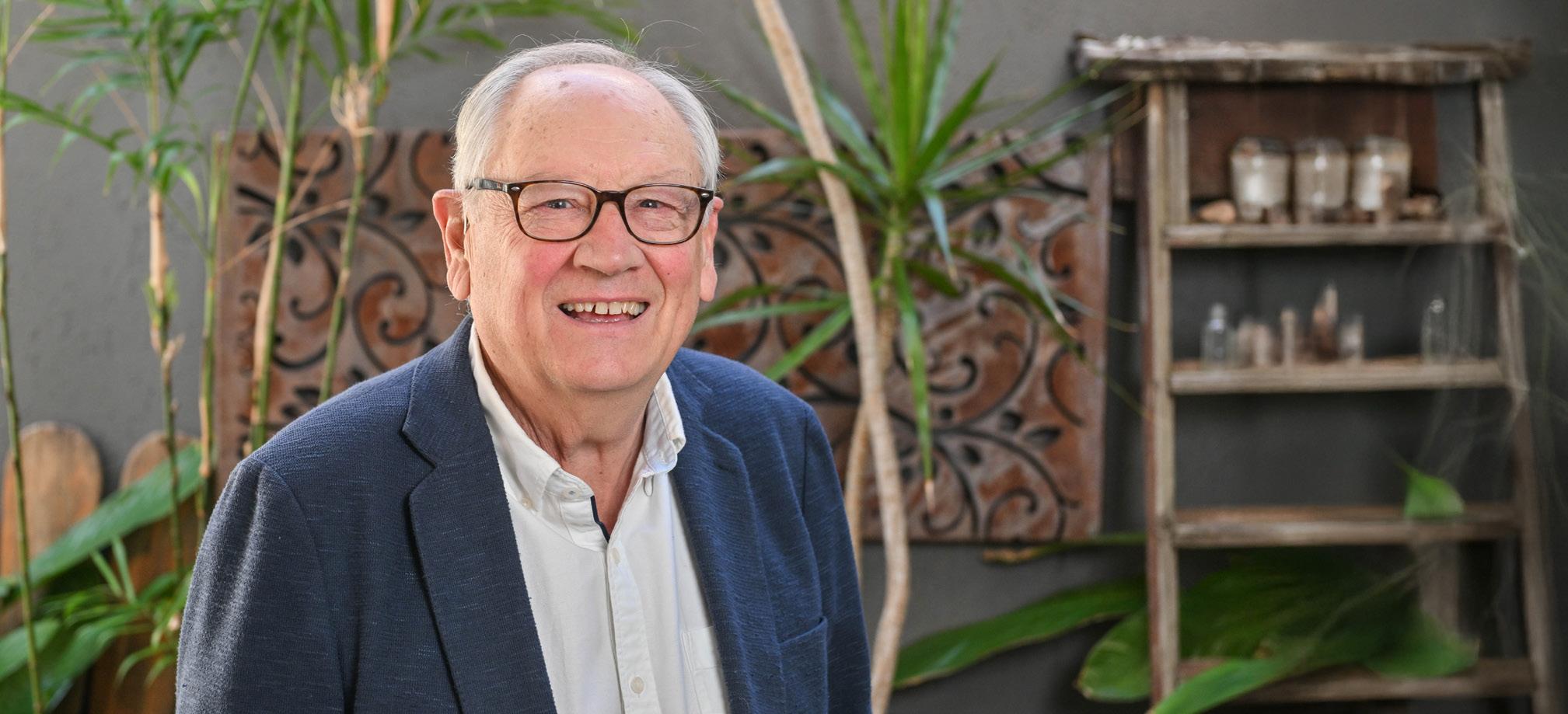
BY LYNDA ALLEN

Dr Michael Roach (BBiotech(Hons) ’08, PhD(Biol) ’15) has been digging deep into the unseen world of viruses living within the human body.
“Viruses are everywhere in our bodies, but many are still completely unknown to science,” says Dr Roach.
“By identifying beneficial viruses called phages, we can develop an arsenal of support to fight off disease – including the growing threat of antibiotic-resistant bacteria.”
Supported by Early Career Research Seed Funding, Dr Roach embarked on a research study to identify hidden viruses we coexist with, and understand their role in the body’s microbiome of bacteria, fungi, and viruses.
Using Setonix, the fastest supercomputer in the southern hemisphere, at Pawsey Supercomputing Centre in Perth, Dr Roach created a revolutionary meta-virome database.
“I have uncovered a vast collection of viruses present in and on the human body and was able to explore the genetic blueprints of many viruses in more detail than ever before.”
This remarkable database will now support phage therapy researchers to develop a vast biobank of phages that can attack harmful bacteria strains – especially those resistant to antibiotics.
“The goal is that when someone has a bacterial infection that can’t be treated with antibiotics, a doctor can provide a mix of helpful phages to quickly fight the infection.”
DR MICHAEL ROACH
Along with the health benefits of the research, the donorfunded Early Career Research Seed Funding provided a significant boost to Dr Roach’s career. The grant enabled him to present his findings at three national conferences, refine his skills in data analysis and bioinformatics, and supervise student researchers.
Now leading the Bioinformatics program at Flinders Health and Medical Research Institute, Dr Roach believes ECR Seed Funding should be available to all new researchers.
“There is an enormous amount of attrition at this early career stage for aspiring researchers, and competition for grant funding and academic positions is fierce. The competitive edge that the University’s ECR Seed Funding provides cannot be overstated,” says Dr Roach.
“These grants are a valuable investment in Australia’s next generation of researchers and offer great value to the community.”
Donate today to provide essential support for our early career researchers to explore new ground in research that will solve significant global issues, save lives and create a better future for us all.
100% of your tax-deductible donation will support the work of emerging researchers through Flinders University’s Early Career Research Seed Funding grant program.

Braden Littler (BBus ’25), a proud member of the Larrakia People in Darwin, is on a path to creating positive change for Aboriginal and Torres Strait Islander communities — a journey shaped by the Nick Llewellyn-Jones Indigenous Commerce Scholarship.
A recent graduate of the Bachelor of Business at Flinders University, Braden is eager to leverage his business skills and knowledge to make a lasting impact.
“One of my life aspirations is to support Indigenous communities, helping them thrive in both business and social spheres," says Braden.
During his studies, Braden was awarded the $10,000 Nick LlewellynJones Indigenous Business Scholarship, which has put him on a trajectory to achieving his goals.
“The funding allowed me to focus fully on my studies and professional growth without the added pressure of working to support myself,” says Braden.
“I joined the Flinders Business Student Association, where I learned about the importance of collaboration, communication, and relationship-building. It also provided me with the incredible opportunity to meet various companies and industry experts.
“Without this support, I wouldn’t have been able to be as proactive in my studies, or go the extra mile in my self-development and achieve my new role on graduation.”
BRADEN LITTLER
Today, Braden is making his mark at Yamagigu Consulting, the largest First Nations consulting firm in Australia. In partnership with international consulting firm Deloitte, Yamagigu Consulting works to support the self-determination of First Nations communities by connecting their Indigenous expertise with Deloitte’s professional services.
Braden is excited about the opportunity to create change, especially on Larrakia land.
“With my connection to Darwin, I plan to support Indigenous businesses up there to thrive," he says.
“I’m particularly interested in how technology can be leveraged in business and applying this to drive meaningful change.”
Donating $20,000 to create the scholarship, Flinders law graduate Nick Llewellyn-Jones (LLB/LP ’03) is Principal and Head of the Native Title, Resources and Renewable Energy team at Norman Waterhouse Lawyers.
An enthusiastic advocate for Indigenous business advancement, Nick designed the scholarship to address a critical gap in business knowledge that can support self-determination for Indigenous communities.
“I hope that by focusing on the importance of business awareness, more Indigenous students feel comfortable taking a leading role in the business world and spreading financial and commercial literacy more broadly,” says Nick.
In his professional life, Nick has made outstanding contributions to improving access to justice for First Nations groups, particularly the Barngarla People, in commercial negotiation and self-determination.
“About 60 per cent of Australia’s mineral industry and much of our new renewable energy industry operates on native title land, with about 30 new commercial Indigenous Land Use Agreements negotiated each year for large commercial projects,” says Nick.
“Indigenous communities often lack the business knowledge or financial expertise to negotiate effective deals with the large international companies who are reaping the benefits.”
“It’s not a fair playing field and we need to start tackling this issue. The scholarship is one way that will help to do this.”
The scholarship is part of a broader strategy that Nick and his colleagues at Norman Waterhouse are implementing to expand Indigenous business knowledge and acumen.
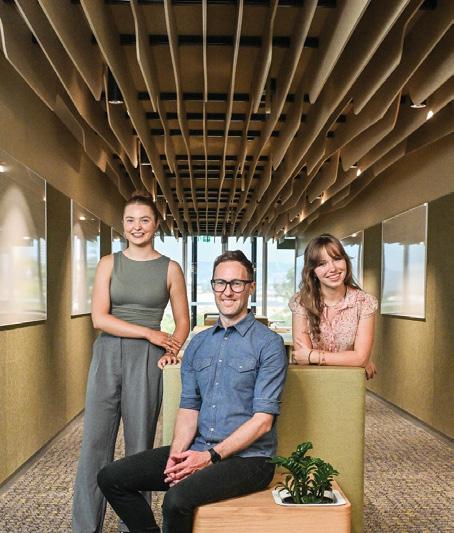
“Through my law firm, we want to help facilitate a generation of business awareness in Indigenous Australians and, more specifically, native title holders,” says Nick.
This includes re-writing part of the Indigenous Law course within the Flinders Law degree to cover native title negotiations and the real-world issues currently facing native title law.
They also have plans to establish a Certificate IV in Registered Native Title Body Corporate Management, and to work with the First Nations Clean Energy Network to run masterclasses on renewable energy negotiations.
“We are also developing a short animation to expand financial literacy for Indigenous business leaders and communities,” says Nick.
With Braden now working towards increasing business capacity for Indigenous communities, it’s evident that these initiatives are already making a positive impact.
“I’m now fortunate to be in a position where, with determination and effort, I believe I can achieve great things,” Braden says.
“I want to be a force for good, using every opportunity to contribute to the betterment of society. It may sound clichéd, but it’s truly what drives me.”
BRADEN LITTLER
Inspired by the life-changing effects of the scholarship and its potential to create long-term change, Nick wants to see the scholarship continue with the support of the broader business community.
“With just 20 businesses contributing $10,000 each, we could create an endowed scholarship that supports an Indigenous commerce student at Flinders each year, in perpetuity,” says Nick.
“It would be great to see the change that comes from this.”
Support Aboriginal and Torres Strait Islander students to advance their business skills through the Indigenous Business Scholarship.
Contact Lynda Allen: 0403 759 729 | lynda.allen@flinders.edu.au

BY SHANNON COLEMAN
Behind every new medicine, device, or treatment that improves lives, is a clinical trial – and at Flinders, the Clinical Trials Unit plays a key role in making them happen. Based within the Health and Medical Research Building (HMRB), this expert team supports researchers from across the University and beyond to design, run and analyse rigorous, impactful trials.
Clinical trials inadvertently affect everyone and there are a few things you might not know about this work that powers real-world health outcomes.
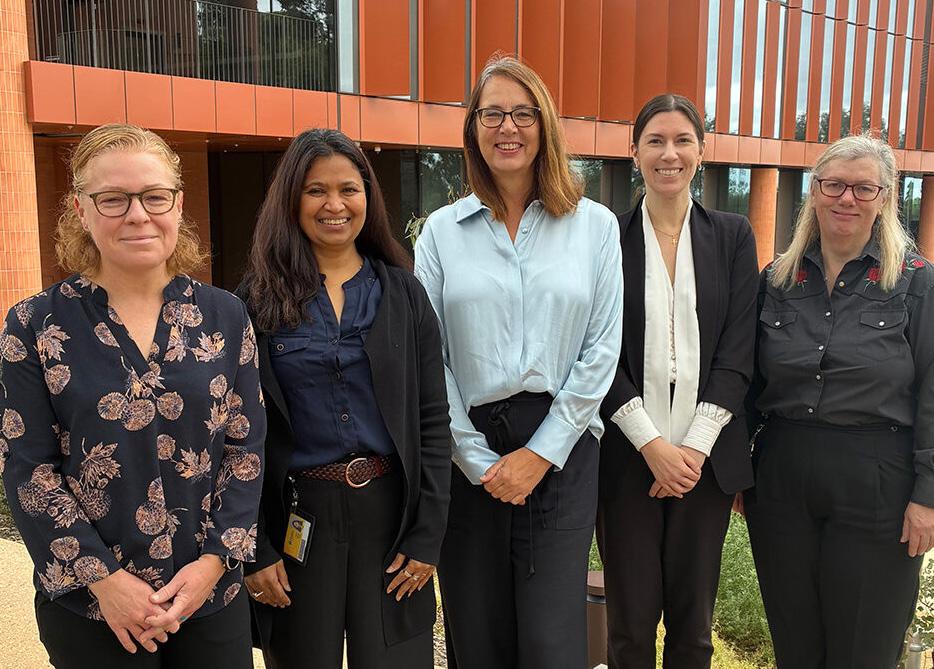
We help Flinders researchers across all colleges (plus external research groups, and industry) with the design, conduct and analysis of research, with a particular focus on randomised controlled clinical trials (RCTs). RCTs are typically used to determine whether an intervention (e.g. a medicine, a device, behavioural support, a test, a process is at least as good as, or better than, usual practice or another intervention.
No research design is perfect, and some designs have more bias than others. Well designed and conducted RCTs minimise bias, which is why they are considered a ‘gold standard’. Given the low risk of bias with trials, their findings are important for informing guidelines, clinical practice, health policy or funding decisions.
Paperwork! Trials require a lot of documents, and they need to conform to national and international standards. These documents help ensure a trial is of high quality and, more importantly, reproducable. But don’t panic, our team is here to ensure that researchers have all the right documents and use them at the right times.
The HMRB enables researchers, practitioners and industry partners to work together more closely than ever before, creating a hub of collaboration within southern Adelaide’s own biomedical research precinct.
Located adjacent to Flinders Medical Centre and Flinders Private Hospital, it is the focal point of research informed by genuine patient need, positioned to make an immediate improvement to people’s health and wellbeing.
Scan to learn more
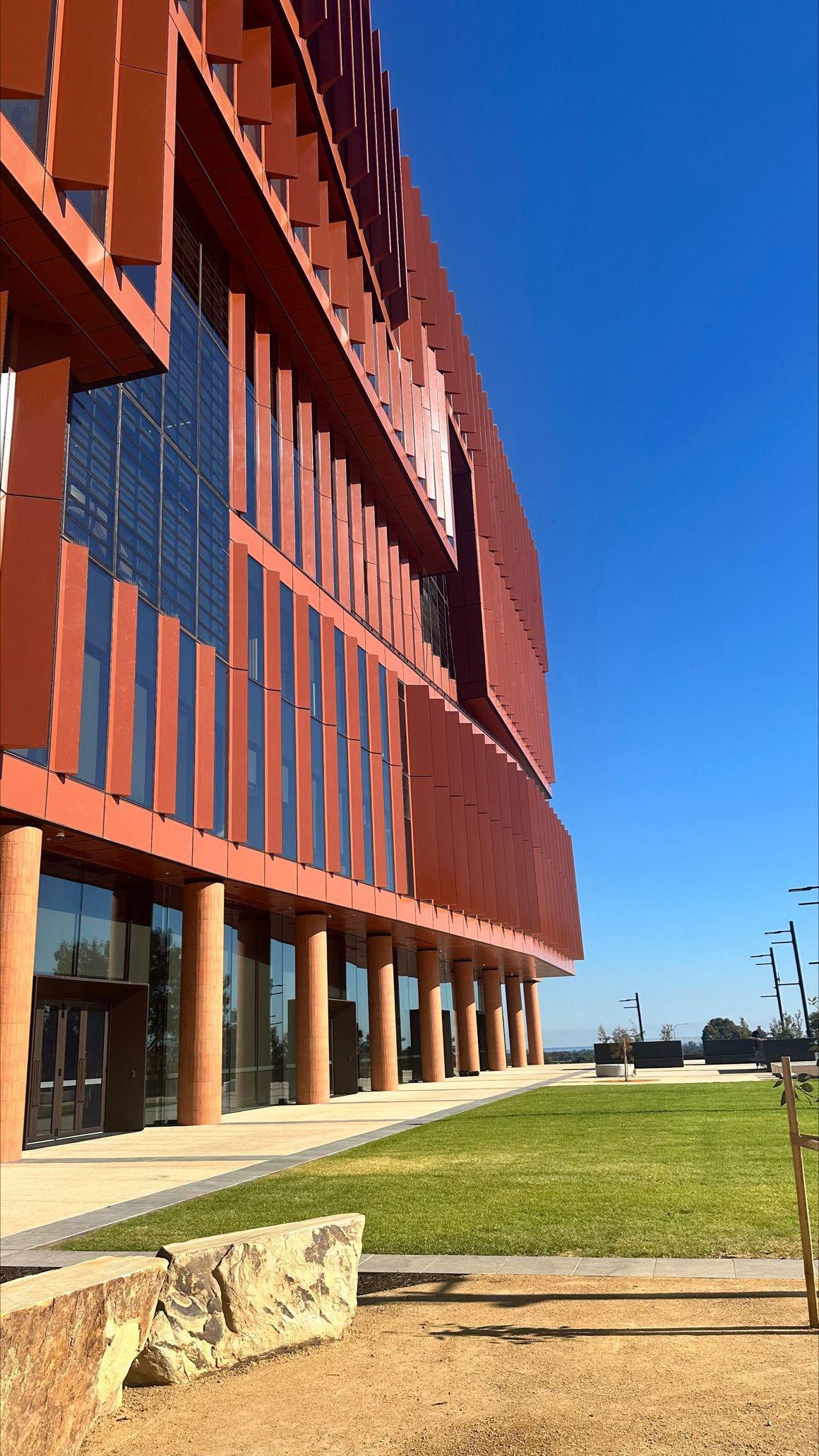

When young leaders come together to solve global challenges, the real change begins. For the first time, Adelaide hosted SHAPE APAC, a UN Youth Global Shapers initiative, bringing together 200 passionate changemakers from across the Asia-Pacific region. Two remarkable students – Imanthi and Ridma – had the opportunity to attend and contribute their vision for a smarter, more sustainable, and inclusive future.
At Flinders, we believe that preparing for the future means acting today. Through a holistic, cross-disciplinary approach, we are equipping the next generation with the skills, knowledge, and networks to drive meaningful change. SHAPE APAC 2025 provided the perfect platform to showcase this commitment.
A collaboration between Flinders’ Sustainability Strategy team, the Factory of the Future, and a futurist AI design-thinking workshop gave conference attendees a glimpse into how we approach the challenges of tomorrow. From advanced manufacturing to ethical AI and sustainability-driven leadership, participants saw firsthand that preparing for the future is not just about technology – it’s about people, ideas, and collective action.
For Imanthi, a PhD and MBA student, the conference reinforced the need for collaboration between science, industry, and policy. Her research on the effects of environmental toxins on the human brain, combined with business acumen, positions her to drive evidence -based regulatory reforms that put human health at the forefront of decision-making. For Ridma, a finance professional in the making, the conference highlighted the role of financial decision-making in sustainability. By integrating Environmental, Social, and Governance (ESG) principles and leveraging AI-driven financial analysis, he aims to foster responsible and equitable economic growth. Both students left SHAPE APAC with a deeper understanding that change is not a solo pursuit – it thrives on interdisciplinary collaboration, shared responsibility, and the courage to think differently.
Members of our alumni community understand that investing in people is crucial. Sponsoring student registration costs isn’t about recognition – it is about ensuring that the right people have access to the right opportunities. The impact of that investment extends beyond a single conference; it ripples into communities, businesses, and policies that shape the world we all share.
As we continue to support the next generation of changemakers, we invite our alumni to be part of this journey. If you’re interested in getting involved with Global Shapers or mentoring future leaders, we’d love to hear from you at nvi@flinders.edu.au. Because the future isn’t something we wait for—it’s something we build together.

Flinders is dedicated to fostering the growth and development of our graduates throughout their careers.
We are delighted to be working with Flinders Law graduates Katherine Barreto (JD ’21) and Jaed Hopgood (LLB/LP(GradEntry) ’21) to develop a Flinders Law Alumni Continuing Professional Development (CPD) Workshop series, which has kicked off in 2025.
Professor Tania Leiman, Dean of Law at Flinders, has championed the project, facilitating the workshops at Flinders’ City Campus. All law professionals are welcome to attend, with Flinders Law graduates encouraged to take advantage of this rare opportunity to reconnect with peers and hear from alumni who have gone onto lead in the legal profession.
The inaugural Law CPD Workshop was held in May, with alumni, friends and industry partners hearing from Flinders graduate Jane Abbey KC (BA ’01, LLB/LP '01), Mark Norman KC and Alex Ward AM.
More than just a lecture, open discussion on ‘Practical Legal Ethics’ was put to the panel. Titled ‘Without Fear or Failure: Advocating for a Client’s Interest Beyond Good and Evil’, attendees could question the ethics barristers are sworn to uphold, providing a thought-provoking night exploring the challenges of advocacy, particularly when a client’s interests conflict with your personal values or when public opinion is strongly opposed to the client.
After the formalities, guests enjoyed light refreshments and drinks while taking in the stunning view of Adelaide's skyline at night from our beautiful Level 14 executive space..
If you’re a Flinders Law graduate, keep an eye on your inbox for the announcement of the next CPD Workshop hosted by Flinders.



At Flinders University, our MBA students don’t just study leadership, they experience it firsthand through our MBA ‘Leading a future workforce’ topic. A standout feature of this topic is the integrated ‘Develop Your Leadership Signature Portfolio’ – a mentoring program which connects students with alumni and industry professionals, who bring a wealth of realworld expertise.
Our dedicated mentors play a vital role in shaping future leaders by offering practical insights and guidance throughout the program.
Beginning in 2021 as a pilot program designed by Dr Rajesh Johnsam with just nine students, it has grown into a soughtafter elective topic, with close to 100 students enrolling each year. Dr Johnsam (Topic Coordinator) and Niki Hasler (Alumni and Advancement Partner), who oversee the program, credit its success to the dedication and generosity of the mentors.
Our mentors play a vital role in shaping future leaders by offering practical insights and guidance throughout the program.
As AI and digital transformation reshape how we work, leadership must evolve too. This topic explores how managers can inspire, motivate, and lead teams in a world where remote work, work-life balance and ethical challenges are front and centre.
Students examine both traditional and emerging leadership theories, while engaging with real-life scenarios. It prepares students to think critically, adapt quickly, and lead with purpose in a future defined by change.
The mentoring program is designed to foster critical selfreflection and leadership growth. In response to the rapidly evolving workforce, we structure the learning through two key group meetings. The first mentoring session focuses on sharing leadership experiences and discussing future workforce demands, while the second provides targeted feedback on each student’s individual leadership development plan.
Through these interactions, students gain valuable insights, reflect on their strengths and areas for improvement, and develop actionable plans to enhance their leadership capabilities for both current and future roles. This mentoring program not only encourages personal growth, but also equips students with practical strategies to navigate the dynamic landscape of modern leadership.
“Mentoring has allowed me to see a longer-term outlook for decisionmaking in my career. It’s supported and guided me toward the right decisions.”
HANNAH MCARDLE, MBA MENTEE

In 2024, Australia and Indonesia celebrated 75 years of diplomatic relations. In that time more than 200,000 Indonesians have studied in Australia. Many of those degrees were made possible by the Australia Awards Indonesia program – one of the largest scholarship programs in Indonesia, offering around 220 scholarships and short term awards each year.
Flinders itself has a long and proud history of engagement with Indonesia, through these scholarships and in the areas of Indonesian language, culture and politics. The University’s initial contact with Indonesian students and the development of long-term collaborative links can be traced back to the earliest days of Flinders’ establishment in 1966.
The strength of our Indonesian alumni, who have gone on to work in many areas across the nation, was evidenced recently when Indonesian President, Prabowo Subianto, announced the ministers that will form his new cabinet, three of whom studied at Flinders on Australia Awards Scholarships. A graduate was also made a Member of Parliament.
Flinders’ own Associate Professor Anton and Kadar Lucas gifted the Pendopo (pictured above) to the University in 1990 to promote Indonesian studies. Today, the Pendopo and the gamelan (a traditional Indonesian musical ensemble) still offer a local focus for Indonesian cultural activities on campus.
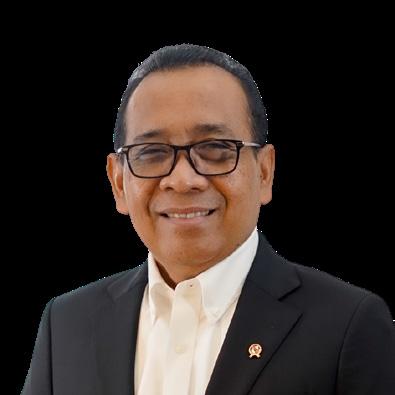
PROFESSOR PRATIKNO
PhD(SS) ’97, DUniversity ’13
Coordinating Minister of Human Development and Cultural Affairs
“Flinders trained me to become an effective learner, someone who embraces new knowledge and develops original thinking in response to the challenges I face. This is what makes graduates from Australia better equipped to respond contextually to evolving challenges and opportunities.”

PROFESSOR ABDUL MU’TI
MEd ’98
Minister of Primary and Secondary Education
“My time at Flinders University in Australia really enriched my understanding about Australia as a multicultural country. As a result, I’m very happy to be involved in many initiatives to bring Indonesia and Australia closer, especially in the areas of education, religion and culture. I also feel that Australia is my second home!”
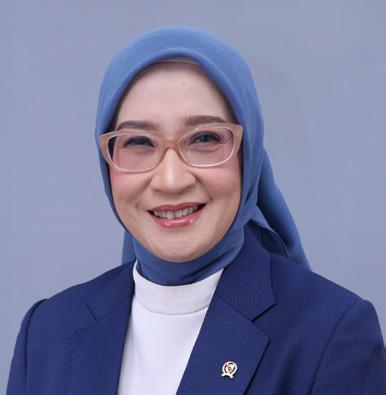
IBU RINI WIDYANTINI
MPubMgmt ’99
Minister of Administrative and Bureaucratic Reform
“While I had studied law, learning about public management was an important area for my development as a government official,” she says. “The subject of my study was a source of great knowledge and competency that my office needed. It set me up for the career that I have today.”

DR HETIFAH SJAIFUDIAN MPP
PhD(SS) ’06
Deputy Chair for Commission X, which is responsible for education, science, technology, youth and sports, literacy, research and innovation, and statistics
“Studying in Australia opened my mind and expanded my perspective. The high quality of education, combined with the supportive environment and social network I found at Flinders, allowed me to manage my studies, personal growth, and family life in a balanced and fulfilling way.”
Read full profiles on all four Indonesian alumni by scanning here

In our complex world, some challenges can’t be solved easily. These are known as ‘wicked problems’ – issues like climate change and poverty, which are so tangled and complicated, they resist simple solutions.
Recently, Flinders University asked 30,000 Australians from across the nation to voice the wicked problems that matter most to them in their local communities.
So, what can we do about them? Tackling wicked problems requires a new way of thinking. It means working together across different fields with governments, industry and the community, being creative and staying flexible. Solutions need to be adaptable, ongoing and take into account the diverse perspectives and needs of everyone affected.
Join us as we dive into the world of wicked problems, exploring real-world examples and how innovative strategies are starting to tackle some of these issues.
Discover how complexity can turn into opportunity and drive meaningful change.
Download a copy of the South Australian and National Flinders Wicked Problems Report 2025 at flinders.edu.au/wickedproblems or by scanning here
Cost of Living
Housing Unaffordability
Access to Quality Healthcare and Community Care
The Environment
Family, Domestic and Sexual Violence
Crime and Safety Trust in Government and Public Institutions
Global Crises
Misinformation and Digital Safety
Chid Safety and Protection
Unemployment and Job Security
Education
Infrastructure and Transport
Lack of Community and Social Connection
Inequities Experienced by Aboriginal and Torres Strait Islander People
BY NIKI HASLER

In 2025, the Washington Internship Program celebrates 25 years of offering Flinders University students an extraordinary opportunity to experience political life at the heart of US democracy. The program places students in influential congressional offices, exposing them to the fast-paced realities, priorities, and pressures of working in the US capital.
Since its inception in 2000, the program has sent close to 150 Flinders students to the US – representing the largest presence in Washington of any university outside the United States.
Successful applicants work as political professionals in the offices of US Senators and Members of the House of Representatives. Each office appoints a staff member to supervise interns and coordinate their tasks. Supervisors also assist their interns with the program’s unique academic component: a major research paper developed by the intern as part of their experience.
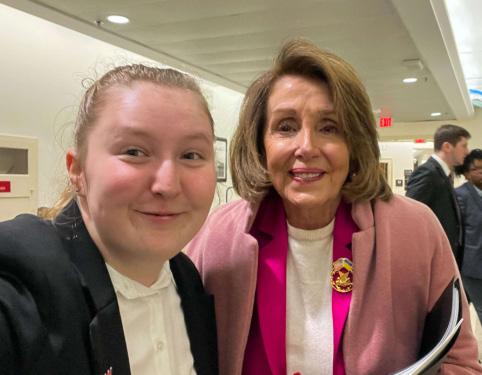

Alyce Ferme, who recently returned from Washington, has had time to reflect on how much she learned and experienced during her eight weeks in Washington, D.C. “It solidifies my passion for policy, but also reinforced the importance of adaptability, curiosity, and taking initiative” says Alyce.
Students return with a letter from their congressman, Senator or a senior staff member in their office attesting to their internship performance, the letter forming an important part of the intern’s professional resume.
This is the case for Zoe Johnston (BIntRelPolSc(Hons) ’25), who was a 2023 intern in Congressman Joe Courtney’s office. Zoe reflects that “the Washington Internship Program was one of the greatest experiences of my life. Not only has it opened so many doors for me as I progress in my career, but it solidified my love for international affairs and diplomacy.”
The Washington Internship Program has a long legacy here at Flinders and we look forward to many more years to come.
“Chatting to Nancy Pelosi about gun violence, brushing shoulders with Joe Biden and Bernie Sanders, having dinner in a members-only dining hall – I’ve had the time of my life in Washington.”
ZOE JOHNSTON, FLINDERS STUDENT
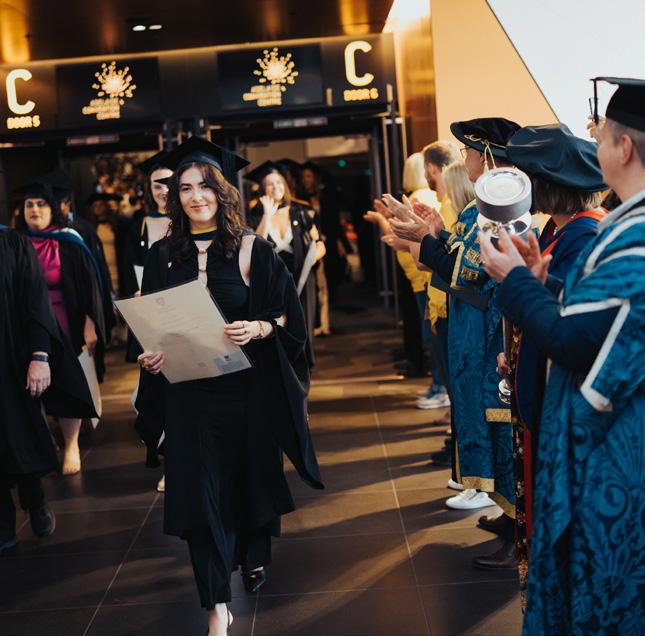





Three days, six ceremonies, more than 2,000 parchments and a million smiles!
Our 2025 April graduation ceremonies marked the first significant career milestone in our newly awarded graduates’ lifelong journey of discovery and learning.
Do you remember your big day? Ceremonies probably look a little different in 2025! Send us your favourite graduation memory for the chance to have it included in an upcoming memory lane social post!
Reach us at alumni@flinders.edu.au. Photos by Juan Photography.
